#but all in all? the themes? the character arcs? the world building?
Text
Blades 2 was good actually
#i won’t deny there were issues#the pacing? yikes#mal’s reunion was. not good#but all in all? the themes? the character arcs? the world building?#10/10#blades of light and shadow#playchoices
86 notes
·
View notes
Text
Watching Dungeon Meshi
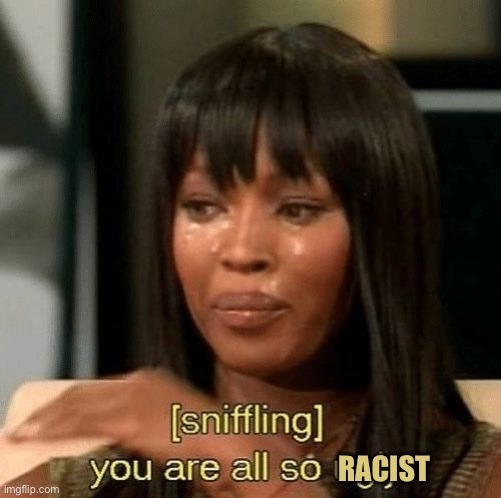
#just to be clear i fucking love this about dunmeshi#often media are too scared and depict themes of racism and classism as bad(tm) (which it is ofc but they portray in a very shallow way)#and only allow bad guys to be racist#or if a good character is racist then they have a quick arc of ‘oh no racism is bad(tm)’ and then everything is better#ryoko kui is excellent at world building and this allows us to understand the nuance of these characters and where prejudice stems from#and it’s not excused or diminished it’s very much portrayed as an issue that only breeds more prejudice#and thus things need to be changed both on an individual and societal level#marcille donato#dungeon meshi#falin touden#ryoko kui#dunmeshi#laios touden#chilchuk tims#kabru of utaya#izutsumi#literally every character#they are all racist af and i love them and ryoko kui for it
288 notes
·
View notes
Text
Posts I've seen in just the last week:
AO3 is one of the most visited sites in the world
It's ok if your fanfic [that you're writing for free in your spare time] is unfinished! You do you!
How very dare these WGA writers not finish writing my stories for me [that they spend full work days every day working on] just because they don't get compensated fairly for their paid labor and decided to go on strike?
Respect unions! Unionize your workplace! Respect picket lines!
Posts I have not seen ever but maybe it's just me ¯\_(ツ)_/¯ :
AO3 would not exist without the paid writers who are currently striking. You would have no stories to write fanfic of. The entire world your fic exists in was created by someone else's labor.
#tbh I don't like how you can't say anything remotely critical about fanfic without people getting up in arms like you're invalidating it#I very much agree fanfic is a valid art form#but most of it very much does rely on the work of writers who are able to develop narratives in ways that a lot fic writers don't need to#and who are practicing a craft they are trained in#and granted I don't really rove in fandom circles#but fanfic very much would not exist if not for someone else's world building and character development#and I haven't seen that acknowledged during this strike at all#people are expecting writers to finish their paid work when they can't even afford health insurance#I see so many posts about how fanfic is a valid genre and it is but that doesn't mean it's the same as professional writing#I love that people have such a passion for writing and storytelling that they do it for free in their spare time!#but that's not the same as doing it for a living and planning out a whole TV season's story arc before writing any episodes#it's not the same as writing every single character and plotline from scratch and understanding that process#it's not the same as understanding how to structure a novel and plan and implement literary motifs and themes and metaphors#which isn't to say fanfic can't do these things but how many fic writers do?#and tbh that's not the point of fic and that's fine but where's the acknowledgment that fics exist because other people DO
8 notes
·
View notes
Text
How To Plan A Book Series: Ultimate Guide
Writing a book series can be an incredibly rewarding experience for authors, but it also requires careful planning and execution. A well-crafted book series can captivate readers, build a loyal fan base, and provide a steady stream of income for writers. However, planning a successful book series is no easy feat.
It demands a deep understanding of world-building, character development, and plot progression. In this ultimate guide, I'll help you explore the essential steps to help you plan a compelling and cohesive book series that will keep your readers hooked from start to finish.
Develop a Compelling Premise The foundation of any successful book series is a strong premise. Your premise should be unique, engaging, and have the potential to sustain multiple books. Consider exploring a complex world, a captivating concept, or a character with a rich backstory that can evolve over the course of several books. Ask yourself: What makes your premise stand out? What will keep readers invested in the story for multiple installments?
Create a Detailed Outline Before you dive into writing, it's crucial to create a detailed outline for your entire book series. This outline should include the overarching plot, major story arcs, character development, and key events for each book. Having a solid outline will help you maintain consistency, avoid plot holes, and ensure that each book contributes to the overall narrative. Don't be afraid to make adjustments as you write, but having a roadmap will keep you on track.
World-Building: Crafting a Vivid and Consistent Universe One of the hallmarks of a successful book series is a richly developed and immersive world. Whether you're creating a fantasy realm, a futuristic society, or a contemporary setting, pay close attention to world-building. Establish the rules, customs, histories, and geography of your fictional world. Consistency is key, so ensure that the details align across all books in the series. Consider creating a "bible" or a comprehensive guide that outlines the intricacies of your world, making it easier to maintain continuity.
Develop Compelling Characters Great characters are the heart and soul of any book series. Your protagonists, antagonists, and supporting characters should be well-rounded, multi-dimensional, and undergo significant growth and transformation throughout the series. Craft backstories, motivations, flaws, and strengths for each character, and ensure that their actions and decisions drive the plot forward. Remember, character development is an ongoing process, so be prepared to explore new facets of your characters as the series progresses.
Establish Recurring Themes and Motifs Themes and motifs are powerful tools that can add depth and resonance to your book series. Identify the central themes you want to explore, such as love, redemption, power, or identity. Weave these themes throughout the series, allowing them to evolve and deepen with each installment. Motifs, like recurring symbols or imagery, can also create a sense of cohesion and add layers of meaning to your narrative.
Plan for Cliffhangers and Resolutions One of the key strategies for keeping readers engaged in a book series is the strategic use of cliffhangers and resolutions. Cliffhangers create anticipation and leave readers craving for the next installment. However, be cautious not to overuse this technique, as it can become frustrating for readers. Balance cliffhangers with satisfying resolutions that tie up loose ends and provide a sense of closure, while still leaving room for the story to continue.
Consider Pacing and Narrative Structure Pacing and narrative structure are crucial elements to consider when planning a book series. Each book should have its own narrative arc, with a beginning, middle, and end, while also contributing to the overall story progression. Vary the pacing between books to maintain reader interest, alternating between action-packed and slower, more introspective sections. Experiment with different narrative structures, such as multiple perspectives, non-linear timelines, or frame narratives, to keep the series fresh and engaging.
Manage Continuity and Consistency As your book series grows, maintaining continuity and consistency becomes increasingly important. Keep detailed records of character descriptions, plot points, world-building elements, and timelines. Regularly refer back to these notes to ensure that you're not introducing contradictions or inconsistencies. Consider creating a series bible or a wiki to help you keep track of all the moving parts.
Plan for Character Growth and Evolution In a book series, characters should undergo significant growth and evolution. Plan for character arcs that span multiple books, allowing your protagonists and supporting characters to face challenges, make difficult choices, and emerge as changed individuals. This character development will not only add depth to your narrative but also keep readers invested in the journey of your characters.
Anticipate and Address Potential Plot Holes As your book series expands, the potential for plot holes and inconsistencies increases. Be vigilant in identifying and addressing these issues during the planning stage. Regularly review your outline and notes, looking for any logical gaps or contradictions. Enlist the help of beta readers or critique partners to provide fresh perspectives and catch any potential plot holes you may have missed.
Consider the Overarching Story Arc While each book in your series should have its own narrative arc, it's essential to plan for an overarching story arc that spans the entire series. This overarching arc should tie together the individual books, building towards a climactic conclusion that resolves the central conflict or mystery. Ensure that each book contributes to this larger narrative, advancing the plot and raising the stakes for the characters.
Plan for Marketing and Promotion Finally, as you plan your book series, don't overlook the importance of marketing and promotion. Develop a strategy for building buzz and engaging with your audience throughout the release of each book. Leverage social media, author events, book tours, and other promotional opportunities to keep your readers excited and invested in your series.
Remember, writing a book series is a marathon, not a sprint, so be prepared to invest time, effort, and dedication into crafting a truly remarkable literary journey. Hope this helped!
Happy Writing - Rin T.
Hey fellow writers! I'm super excited to share that I've just launched a Tumblr community. I'm inviting all of you to join my community. All you have to do is fill out this Google form, and I'll personally send you an invitation to join the Write Right Society on Tumblr! Can't wait to see your posts!
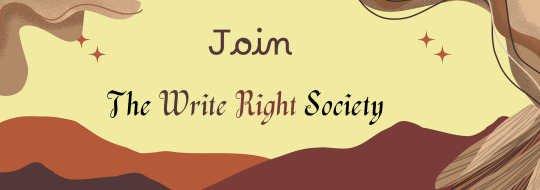
#creative writing#thewriteadviceforwriters#writeblr#on writing#writing#writers block#writers on tumblr#writing tips#how to write#writers and poets#writing advice#writing resources#novel writing#writing blog#writer#writer stuff#writerslife#creative writers#helping writers#writersociety#writerscommunity#resources for writers#ao3 writer#female writers#book series#book review#booklr#booktok#books and reading#fantasy fiction
3K notes
·
View notes
Text
TRAİLERDB - DEVASA+ (3)
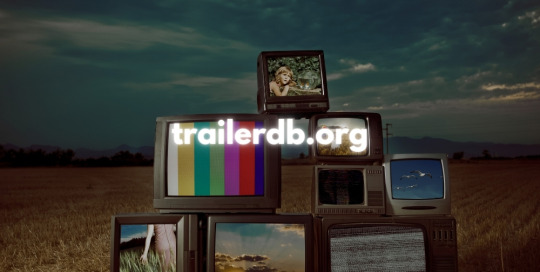
As we eagerly anticipate upcoming releases, the right trailer can set the tone and build our enthusiasm for what’s to come. In this blog post, we will explore the freshest trailers, giving you a sneak peek into the films and TV series that are about to hit screens near you. From highly anticipated films to captivating TV series trailers, we’ve got you covered with all the essentials.
Latest Trailers
When it comes to keeping up with the ever-evolving world of entertainment, latest trailers play a significant role in generating buzz and excitement among fans. Every week, we are treated to a flurry of new previews that showcase the hottest upcoming films and series. Here’s a look at some of the most anticipated releases that you should keep an eye on.
One of the most talked-about latest trailers features the action-packed return of a beloved franchise. With stunning visuals and gripping storytelling, this trailer leaves us eager for the release date. The combination of stellar performances and a captivating soundtrack promises an exhilarating cinematic experience.
In the realm of animation, the latest offerings are equally impressive. The trailers highlight vibrant animation styles and heartwarming narratives that are sure to attract audiences of all ages. From family-friendly adventures to more mature themes, the latest trailers in animation showcase the diversity and creativity in storytelling.
Furthermore, the world of streaming platforms is overflowing with exciting latest trailers. With platforms like Netflix, Hulu, and Amazon Prime constantly releasing fresh content, viewers are treated to an array of genres, from gripping thrillers to heartfelt dramas. These trailers give a sneak peek into the rich storytelling and character development that we can look forward to.
Don’t forget that latest trailers also provide insights into upcoming TV series. Whether it’s a highly-anticipated season continuation or a brand-new concept, these previews are designed to engage fans and keep them coming back for more. Expect to see dramatic cliffhangers and intriguing character arcs that will undoubtedly spark discussions among viewers.
In conclusion, latest trailers serve as a window into the captivating stories that lie ahead. They not only excite fans but also shape our expectations of what’s to come in theaters and on screen. Stay tuned for more updates, as there are always more incredible trailers on the horizon!
Tv Series Trailer
In the world of entertainment, the TV series trailer serves as a pivotal tool for enticing audiences and generating excitement. With the rise of streaming platforms, the competition for viewers' attention has intensified, making trailers more crucial than ever.
One of the primary functions of a TV series trailer is to provide a glimpse into the show's storyline, characters, and overall tone. A well-crafted trailer can evoke emotions, build suspense, and leave viewers eager for more. For instance, trailers for popular series often highlight key moments, thrilling action sequences, and dramatic cliffhangers that captivate audiences.
Moreover, the editing style of a TV series trailer significantly influences its impact. Fast cuts, captivating visuals, and a powerful soundtrack can enhance the excitement and engagement level. As a result, viewers are more likely to share these trailers on social media, amplifying their reach and generating buzz.
In recent years, we've seen a shift in how trailers are released. Many production companies now opt for teaser trailers, followed by full-length versions. This strategy keeps fans engaged over a longer period, as each release builds anticipation for the show's premiere.
As viewers have become more discerning, trailers have evolved to include more diverse storytelling elements. Today’s trailers often reflect the complexity of characters and intertwine various plotlines. This trend allows audiences to connect more deeply with the series before they even watch an episode.
An important aspect to consider is the impact of TV series trailers on the show's marketing strategy. They often serve as a crucial element in the overall promotional mix, alongside posters, interviews, and social media campaigns. A strong trailer can significantly boost a series' visibility and attract a broader audience.
In conclusion, TV series trailers are not just promotional tools; they are artistic creations that encapsulate the essence of a show. As the landscape of television continues to evolve, the role of trailers in shaping viewers' perceptions will undoubtedly remain significant.
Trailer DB
Welcome to the your ultimate source for all things related to movie and TV trailers. In today’s digital age, where visual content reigns supreme, trailers play a crucial role in building excitement and anticipation for upcoming entertainment releases. This is where the Trailer DB comes into play, providing you with a comprehensive database of the latest trailers.
The Trailer DB is designed to cater to the needs of film enthusiasts and TV series fans alike. Here, you can discover latest trailers from various genres, ranging from action-packed blockbusters to heartwarming dramas. Whether you’re on the hunt for the upcoming superhero films or the hottest new TV series, the Trailer DB ensures you stay updated on the most recent releases.
One of the standout features of the Trailer DB is its user-friendly interface, which allows easy navigation to find trailers by categories, release dates, or popularity. With an extensive collection of trailers, you can quickly access both local and international titles, ensuring you never miss out on any cinematic gems or trending shows.
Moreover, the Trailer DB is continuously updated with the latest content, offering sneak peeks of highly anticipated films and series. From thrilling horror releases to delightful romantic comedies, there’s something for everyone. Each trailer is accompanied by essential information including release dates, cast details, and directorial credits, allowing viewers to dive deeper into the projects that catch their eye.
Join the community of film buffs and series aficionados today by exploring the Trailer DB. Embrace the excitement of new releases and share your thoughts on the latest trailers with fellow enthusiasts. With our extensive database at your fingertips, you’ll always be in the know about the best upcoming entertainment!
607 notes
·
View notes
Text
This is going to be very ranty and disjointed, probably borderline incomprehensible post, but with the "return" of Dragon Age Discourse (and really, did it ever go anywhere?) and me repeatedly seeing the complaints and dismissals of DA:I as a "chosen one"-type of a narrative, I just.... I keep finding myself thinking about the relationship of truth and lies within the game.
Throughout the course of DA:I, the idea of a malleable, flexible personal identity, and a painful confrontation with an uncomfortable truth replacing a soothing falsehood, follows pretty much every character throughout their respective arcs.
There are some more obvious ones, Solas, Blackwall, The Iron Bull, their identities and deceptions (of both those around them and themselves) are clearly front and center in the stories told about them, but this theme of deception (both of the self- and the outside world) is clearly present in the stories of the others as well.
Like, for example, ones that come immediately to mind are stories like that of Cullen, who presents an image of a composed and disciplined military man, a commander- all to hide the desperate and traumatized addict that he sees himself as.
Dorian grappled with the expectations of presenting the image of the perfect heir to his father's legacy, the prideful scion of his house, his entire life (he even introduces himself as the result of "careful breeding", like one might speak about a prized horse)- all while knowing that his family would rather see him lobotomized and obedient, than anything even just resembling his vibrant and passionate self.
Cassandra calls herself a Seeker of Truth, and takes pride in that identity- only to learn that in reality, she has been made a liar, a keeper of secrets, without her knowledge or consent, and it is up to her to either uproot the entire organization and painfully cut out the abscess it is to build it back from the ground up into something respectable, or let the information she had revealed sit, and continue to fester.
And this theme continues and reframes itself in, among others, things like Sera's own inner conflict between her elven heritage and her human upbringing, or in Cole being caught in this unconscionable space in-between human and spirit, between person and concept, etc.
The Inquisitor isn't exempt from this either.
I feel like this is where the core of the many misunderstandings of this plot come from, why so many people continue to believe that Inquisition is a "chosen one" or "divinely appointed" type of story, because I think many might just... not realize, that the protagonist's identity is also malleable, and what they are told in the setup/first act of the game is not necessarily the truth.
The tale of the Inquisitor is the exact opposite of that of a "chosen one" story: it's an examination and reflection of the trope, in that it is the story of an assumption that all wrongly believe to be the truth, and thrust upon you, even if you protest. The very point is that no matter who you choose to say that you are, you will be known as the Herald of a prophet you don't even necessarily believe in, and then that belief will be proven wrong, leaving you to cope with either a devastating disappointment if you believed it, or a bitter kind of vindication if you didn't.
There's a moment just after Here Lies the Abyss (when you learn of the lie you've been fed your entire journey in the game) that I don't often see mentioned, but I think it's one of the most emotionally impactful character moments, if you are playing an Andrastian Inquisitor who had actually believed themselves chosen (which I realize is a rather unpopular pick, lol): it's when Ser Ruth, a Grey Warden, realizes what she had done and is horrified by her own deeds, and turns herself in asking to be tried for the murder of another of her order. As far as she is concerned, she had spilled blood for power, and regardless of whether she was acting of her own volition at the time, whether she had agency in the moment, is irrelevant to her: she seeks no absolution, but willingly submits to any punishment you see fit.
And only if you play as an Inquisitor who, through prior dialogue choices, had established themselves as a devout Andrastian, can you offer her forgiveness, for a deed that was objectively not her fault- not really.
You can, in Andraste's name, forgive her- even though you, at that point, know that you have no real right to do so. That you're not Andraste's Herald, that Andraste may or may not even exist, and that you can't grant anyone "divine forgiveness", because you, yourself, don't have a drop of divinity within you. You know that you were no more than an unlucky idiot who stumbled their way into meddling with forces beyond their ken.
You know you're a fraud. You know. The game forces you to realize, as it slowly drip-drip-drips the memories knocked loose by the blast back into your head, that what all have been telling you that you are up to this point, is false. And yet, you can still choose to keep up the lie, and tell this woman who stands in front of you with blood on her hands and tears in her eyes, that you, with authority you don't have, grant her forgiveness for a crime that wasn't hers to commit.
Because it's the right thing to do. Because to lie to Ser Ruth is far kinder than anything else you could possibly do to her, short of refusing to make a decision altogether.
There are any number of criticisms of this game that I can accept (I may or may not agree depending on what it is, but I'm from the school of thought that any interpretation can be equally valid as long as there's text that supports it, and no text that contradicts it), but I will always continue to uphold that the Inquisitor is absolutely not- and never was a "chosen one".
They're just as small, and sad, and lost, as all the other protagonists- the only difference is that they didn't need to fight for their mantle, because instead of a symbol of honor, it acted as a straitjacket.
#squirrel plays dragon age#dragon age#dragon age: inquisition#idk i'm just musing#talking basically to myself here i know#ignore me lol i'm just in my feelings about this game#i might tack onto this the like. 3k word jumble of circular arguments i have written down somewhere#about the moral responsibility and culpability of the vampire spawn in bg3#because i have a lot of thoughts about that too#or the couple hundred words i have in my back pocket about dragon age's unique treatment of godhood and divinity in general
619 notes
·
View notes
Text
Katara and Mutuality in Relationships
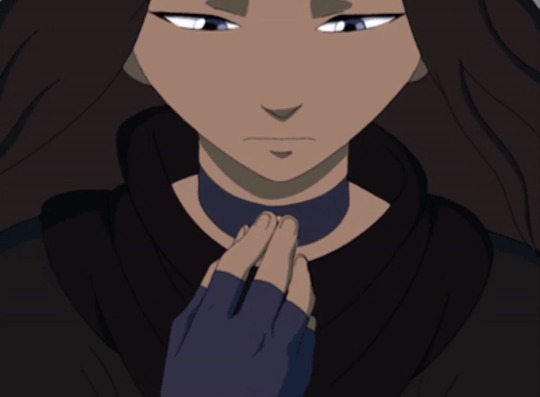
There are lots of conflicting opinions about which characters Katara felt attraction towards, which characters she didn’t, and how long she felt that attraction. I see in most cases, people point to quick clips of her faintly blushing or kissing another character on the cheek as evidence, but I think these kind of takes miss the nuance of the purpose attraction serves in a story.
Most importantly, I see these characters treated as if they are actually people capable of making their own decisions. It’s important to remember that these are fictional characters. They don’t make their own choices; the writers make their choices for them for the purpose of telling a story. From that standpoint, it’s more valuable to examine how a character’s story and narrative themes tie into their relationships with other characters. Animators can shove in a kiss or a blush wherever they want, but it’s harder to demonstrate through storytelling how and why two characters might feel attraction towards one another, and how a relationship between them would develop both characters and contribute to the overarching themes of the story.
In other words, when discussing which characters Katara is “attracted” to, I’m discussing which relationships and actions within the narrative build on her established story and arc. Romance is always integrated into a story for a reason, and considering that reason is important.
Unfortunately, ATLA is very much a product of its time in this way. It’s easy to see what romance adds to the arcs of the male characters—but not so much with the female characters. All three canon relationships (kataang, sukka, and maiko) follow this trend to some degree. The primary purpose of the woman in this narrative is to act as a prize for the man for performing some good deed. Once they’re together, she ceases having her own motivations and becomes an extension of the male character she’s dating. This is pretty blatant with Suki—she barely had a personality in that later seasons; she is there to be Sokka’s girlfriend. Similarly, Katara becomes a completely different character—she’s even animated differently—when the narrative pushes her into romantic scenes with Aang. Her character is flattened.
So what is Katara’s arc, and how do the romantic interactions she has throughout the series contribute to this?
Well, that could be a whole other essay itself, but to put it simply, Katara’s arc is one of a young girl devastated by grief at a young age clinging to hope that she has the power to fight and change the world for the better. Which she does as she gains power and confidence throughout the series—culminating in her defeating Azula in the finale.
But the part I want to focus on here is how Katara connects with other characters. She connects with them over shared experiences of grief and loss.
Take Haru, for instance.
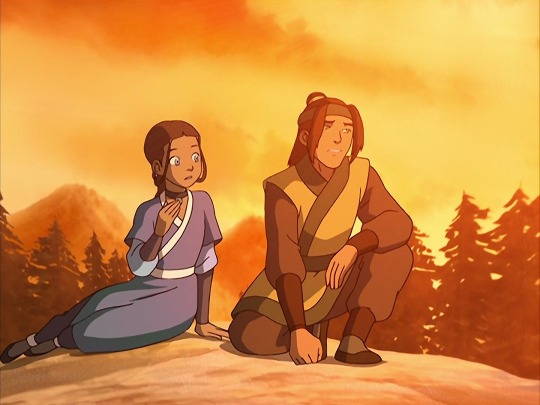
Haru: After the attack, they rounded up my father and every other earthbender, and took them away. We haven't seen them since.
Katara: So that's why you hide your earthbending.
Haru: Yeah. Problem is…the only way I can feel close to my father now is when I practice my bending. He taught me everything I know.
Katara: See this necklace? My mother gave it to me.
Haru: It’s beautiful.
Katara: I lost my mother in a Fire Nation raid. This necklace is all I have left of her.
Haru: It’s not enough, is it?
Katara: No.
This isn’t just a throwaway moment; it’s an important character moment that leads up to growth and the progression of Katara’s overall story, both in this individual episode and in the whole series.
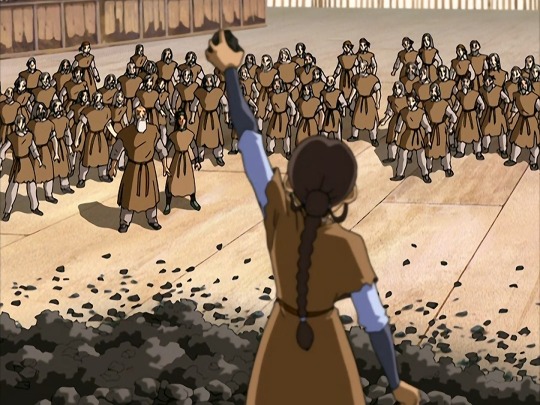
Katara finds her power in the connections she’s able to make with other characters. It’s a powerful driving force for her that makes her a strong character even before her bending abilities develop. Imprisoned was such an important episode to establish who Katara is and what her power is, and adds so much to her arc.
But there is one line in particular from the above exchange that also stands out: Haru says “it’s not enough, is it?” and Katara agrees. Even this early in the series, we’re establishing the fact that despite her drive and hopeful outlook, Katara feels deeply hurt, she feels a deep sense of loss that she opens up about to other characters in moments like these. But unlike Haru…Katara can’t go rescue her mother. Her mother is dead, and we see her grapple with that grief throughout the series.
Another character she reaches out to like this is Jet.
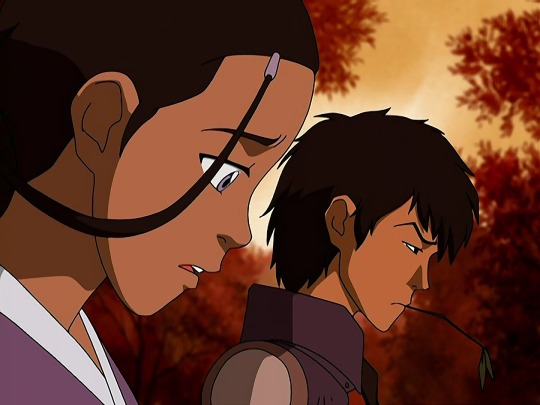
Jet: Longshot over there? His town got burned down by the Fire Nation. And we found The Duke trying to steal our food. I don't think he ever really had a home.
Katara: What about you?
Jet: The Fire Nation killed my parents. I was only eight years old. That day changed me forever.
Katara: Sokka and I lost our mother to the Fire Nation.
Jet: I’m so sorry, Katara.
Another important note about Jet is that there are explicit romantic feelings from Katara in this episode. Again, Katara empathizes with another character through a shared sense of loss. Sadly, in this case, Jet manipulated her feelings and tricked her into helping in his plot to flood the village…but those feelings were undeniably there.
That was the tragedy in this episode, but it also gives the audience so much information about Katara as a character: what motivates her, and what she wants. Katara is established as a character who wants someone who will connect with her and empathize with her over her loss—her greatest sense of trauma. She wants to help others but also receive support in return. The reason why she was smitten with Jet, beyond just initial attraction, is because he gave her a sense of that before Katara realized his true motivations.
A lot of people make the claim that Aang is good for Katara because he also feels a sense of great loss and trauma. And while on paper that’s true…does he really demonstrate that? I just gave two examples of characters Katara connected with this way, and both responded with deep empathy to what she said. Very early on in the show—the third episode—Katara attempts to connect with Aang the same way. How does he respond?
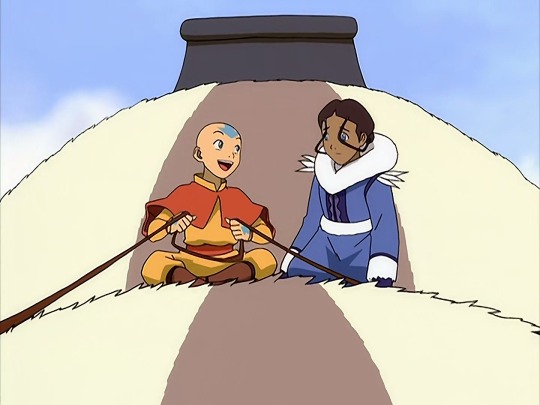
Katara: Aang, before we get to the temple, I want to talk to you about the airbenders.
Aang: What about 'em?
Katara: Well, I just want you to be prepared for what you might see. The Fire Nation is ruthless. They killed my mother, and they could have done the same to your people.
Aang: Just because no one has seen an airbender, doesn't mean the Fire Nation killed them all. They probably escaped!
Just compare this exchange to Haru and Jet. No effort to empathize, not even a “sorry for your loss” or anything. It’s a stark contrast, and the reason for that is because this narrative entirely centers Aang. Katara’s narrative always seems to be secondary to his when they’re together—which is exactly my point when I say this relationship has a fundamental lack of mutuality. It’s built that way from the beginning of the series. It does not add to Katara’s arc nor establish what about this dynamic would attract her.
And, look, before someone jumps down my throat about this…I’m not saying Aang is a horrible person for this response. I think it’s a sign that he’s immature and has a fundamentally different approach to problems than Katara. Katara is a character who has been forced to take on responsibilities beyond her years due to being a child of a war-torn world. Aang’s approach to problems is avoidance while Katara never had that luxury. It doesn’t mesh well.
This is all in Book 1. I honestly could have gotten on board with Kataang if the series meaningfully addressed these issues…but it didn’t. In fact, they actually got worse in some ways.
Back to Katara’s mother. We’ve established that this is a core part of Katara’s character and like in the scene with Haru, she indicates that this is an unresolved issue that pains her. But then, in Book 3, Katara actually does get a chance to confront this pain.
This would have been a powerful moment. Surely the character who is meant to be her partner, her equal, would have been there for her. Surely he would have understood and supported her, fulfilling her narrative and adding to her story.
But Aang didn’t do that. I won’t go into details because there are a million analyses out there on The Southern Raiders, but Aang’s response to Katara was the opposite of understanding. He got angry with her, insinuated that she was a monster for wanting revenge, and tried to dictate her behavior according to his own moral values. And importantly, from a narrative standpoint, he did not go with Katara. One of the most important events in her arc, and Aang didn’t support her—he actually tried stopping her. He didn’t contribute to her growth and development.
Also noteworthy:
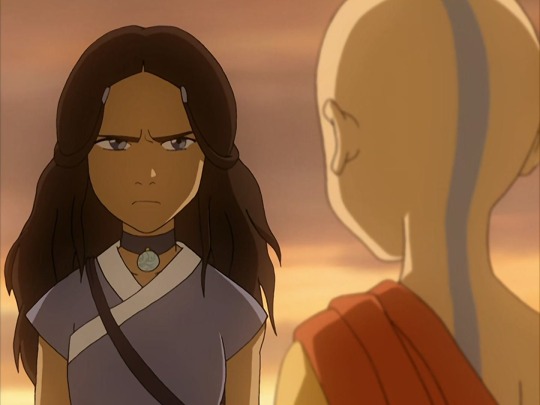
Katara: But I didn’t forgive him. I’ll never forgive him.
Even at the end of the episode, Aang clearly doesn’t understand at all what Katara is feeling. This line demonstrates it perfectly. He thinks she forgave him when that wasn’t the case at all…but of course, he didn’t even accompany her, so he didn’t see what actually took place. His worldview is fundamentally different from hers, and he’s consistently too rigid in his morality and immature to center Katara’s feelings.
Throughout Katara’s whole arc, her most significant character moments, Aang’s character just doesn’t come through the way Katara’s constantly does for him. Their narrative lacks mutuality. When Katara and Aang are together, she becomes an accessory to him. The ending scene is a perfect demonstration of this.
Now, to address the elephant in the room.
Which character does actually add to Katara’s narrative and support her growth as a character?
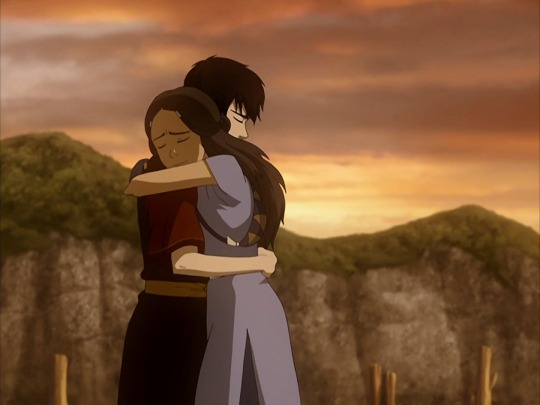
Correct! I just talked about how important The Southern Raiders is to Katara’s character and story, how it’s a chance for her to finally address the grief she’s been carrying since Book 1. And who stood by her side throughout this pivotal moment? Right—Zuko did.
You can talk all you want about how he’s a “colonizer” while Aang’s people suffered genocide, but you’re forgetting that “show, don’t tell” is one of the most basic aspects of storytelling. The fact is, despite how it looks on paper, Zuko was the one there for Katara at her critical moments. Zuko empathized with Katara more than Aang ever did—as demonstrated in this episode. Zuko never once brought up his own cultural values. Zuko never once told Katara what to do. Zuko’s position was that Katara should be the one to decide, and that he would support any choice she made. He supported her decision to spare Yon Rha, but he would have also supported her if she decided to kill him. I actually found this episode to be a satisfying reversal to what is typically seen in TV—for once, the female character is centered while her male counterpart takes the backseat and becomes a supporting role to her narrative.
Even before this, Zuko is shown to empathize with Katara.
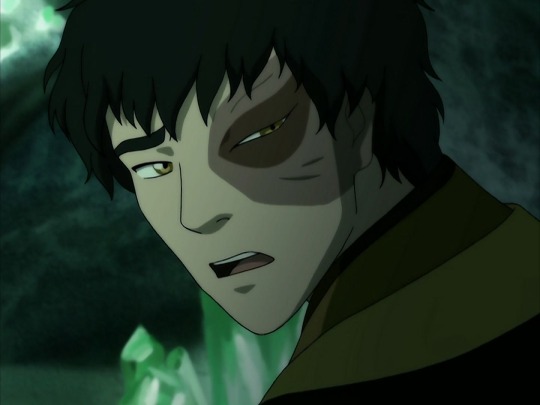
Zuko: I’m sorry. That’s something we have in common.
I think what gets me about this scene is the fact that he’s still Katara’s enemy, and she was just yelling about how she hates him and his people. But despite that, Zuko still empathizes with Katara. She is fundamentally human to him, and he expresses that to her in a way that allows them to connect. Zuko stands to gain nothing from this. It’s true that Azula entered the picture and twisted things around—but in this moment, Zuko’s compassion is genuine. His instinct was to respond to her grief with empathy, just like she consistently does for other characters.
And finally, how else does Zuko add to Katara’s arc?
I don’t think there is any more perfect of an example than the finale itself—the culmination of the arcs and development of all characters.
Zuko and Katara fight together. In a heartbeat, Zuko asks Katara to fight by his side against Azula, because he trusts her strength. She’s his equal—both in his mind, and in a narrative sense.
Then, this:
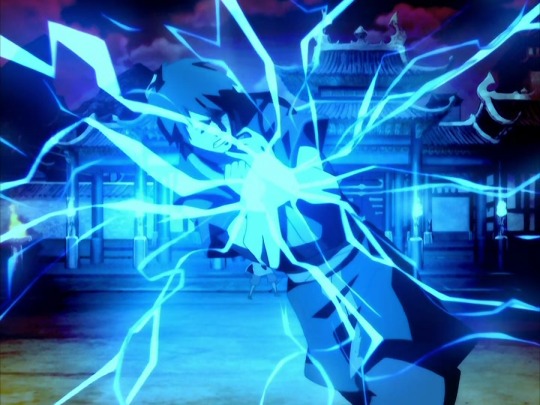
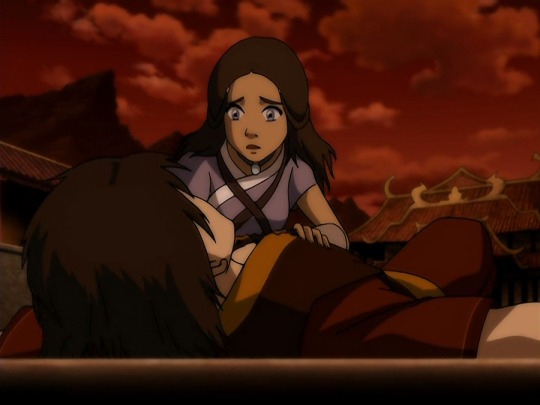
Both of their roles are so critical in this fight. They both save each other. The scene has such raw emotion to it. These characters were together at the conclusion of their respective arcs for a reason.
This is the perfect conclusion to Katara’s arc. She just played a critical role in ending the war that has caused her trauma her whole life. She just demonstrated her mastery of waterbending (another thing she’s dreamed of throughout the series) by defeating the world’s most powerful firebender during Sozin’s Comet. Even though she had help as all characters do, these are victories that belong to her and demonstrate the growth and power of her character. And to top it all off? She was able to save Zuko’s life. She didn’t have to endure the pain of feeling helpless to do anything while someone else died for her; this time, she had an active role, she changed her fate, and she prevailed. Zuko plays an important role in Katara’s story without dominating it. They perfectly represent mutuality. They add to each other’s stories. Their narratives become stronger when they’re together, without one diminishing or sidelining the other.
So, from that standpoint, that’s why I always see the attraction between Zuko and Katara and why I see it lacking between Aang and Katara. Zuko and Katara’s story doesn’t need some cheap little throwaway moments to shine. It’s integral to both characters’ stories. We are shown not told of the way these characters feel about each other. Given everything we know about Katara, her goals, her values, her past loves…absolutely everything points to Zuko being the true subject of her feelings.
Because let’s be honest. The ending I just described is so much more powerful and so much more Katara than seeing her being relegated back to a doe-eyed love interest for Aang to kiss. It hardly even made sense—Katara played no role at all at the culmination of Aang’s arc. She was relegated back to a love interest, rather than the powerful figure we saw fight alongside Zuko.
#zutara#katara#zuko#atla#anti kataang#canon critical#jet#haru#katara deserved better#aang critical#meta#analysis
649 notes
·
View notes
Note
how do i make my writing more ‘mature’? i always feel like no matter how sophisticated i write and no matter every which way i change it up it always has a sense of being childish or juvenile.
Making Writing Sound More Mature
1 - Better Plot and Story Structure - One of the telltale signs of juvenile writing is a story that meanders, has no obvious plot or structure, has no conflict or has a protagonist with no goal. So, make sure you have a well fleshed out plot, with a conflict, protagonist goal, and which hits the beats specific to your story's genre.
2 - Three-Dimensional Characters - If you're writing plot-driven fiction, make sure your main characters have a fleshed out personality, stakes, motivation, goal, and compelling relationships with other characters. If you're writing fully or partially character-driven fiction, do all of the above, but also make sure your main characters have a relevant internal conflict and a thoughtful character arc.
3 - Well-Developed Setting and World - One common hallmark of juvenile writing is a lack of "sense of place" and under-developed world building. So, make sure you put a lot of thought into where your story takes place... not just the immediate setting of each scene, but the overall world of the story, or at least the parts of it that are relevant.
4 - Incorporate Literary Devices - Juvenile writing tends to be lacking in the use of metaphor, simile, symbolism, irony, themes, and motifs. So, make sure to include those, but also take the time to make them relevant to your story.
5 - Include a Broad Range of Vocabulary - One common element of juvenile writing is a reliance on limited, simple vocabulary. Don't be afraid to use a thesaurus to find more interesting word choices--just be absolutely certain to crosscheck your choices with a dictionary to make sure they are the right choice. Online thesauruses in particular are bad about offering up bad suggestions. Also, make sure to learn and use special vocabulary that is relevant to your story, genre, or setting. For example, if your character is a retired police detective trying to solve a murder on his stalled cruise to Alaska, you need to make sure you know the proper investigative terminology, because he will definitely use it. And, by that same token, you'd want to make sure you know cruise ship lingo as well. And, part of this, too, is getting better at description and the inclusion of emotional and sensory detail.
6 - Use Varied Sentence Structure - This is a big one... juvenile writing tends to use repetitive sentence structure, such as simple sentences (she stood up, she went to the window, she waved at the man), lack of subordinate clauses (Tad Smith, who was a seasoned and retired investigator, had looked forward to this cruise his whole life...), repetitive starts (every sentence begins with a pronoun, for example), uniform length (all short sentences, for example.) So, make sure your sentences are varied. If you read them out loud, you don't want it to sound rhythmic, but more like a complex melody.
7 - Show, Don't Tell... Most of the Time - Telling definitely has its place, but most of the time you want to show rather than tell, meaning that instead of stating things simply and directly (the sun was shining) you want to paint a clear but indirect image (dappled sunlight shone through the trees.)
8 - Avoid Cliche Phrases - Human language is littered with everyday phrases like "to each their own" or "better late than never." Generally-speaking, you want to avoid these phrases in your story, especially in exposition. If you include them anywhere, they're best spoken as dialogue by a character who it makes sense would say something like that. Likewise, be careful of cliche genre or character-type phrases. For example, villains who say things like "we're not so different, you and I..." or "I finally have you right where I want you!" These overused phrases tend to make stories sound juvenile and unpolished.
9 - Avoid Cliche Tropes - Another type of cliche to avoid if you want more mature-sounding writing is cliches of various tropes. Tropes on their own are a good thing, but when tropes are used the same way over and over again in a genre or type of story, they become predictable. For example, the super gorgeous protagonist who everyone is in love with, but they view themselves as plain and not special. Or the broken/hopeless/addict mentor character. It's not that you can't use any cliche tropes at all, just make sure your story isn't riddled with them, and do what you can to put your own spin on the ones you do use.
10 - Read, Read, Read - And I can't stress this enough... the absolute best way to improve your writing style and take your writing from juvenile to polished is to make sure you're reading a lot of fiction, in a lot of genres, by a lot of authors. Audio books, short stories, and poetry count, too. The more you read, the more you begin to: understand plot and story structure, recognize well-developed characters, easily envision complex settings and worlds, learn vocabulary and literary devices, become attuned to varied sentence structure, and learn to recognize cliche phrases and tropes.
Happy writing!
•••••••••••••••••••••••••••••••••
I’ve been writing seriously for over 30 years and love to share what I’ve learned. Have a writing question? My inbox is always open!
♦ Questions that violate my ask policies will be deleted!
♦ Please see my master list of top posts before asking
♦ Learn more about WQA here
261 notes
·
View notes
Text
MASSIVE gojo x reader fanfic rec (no spoilers)
ok i know a lot of my followers are gojo girlies and i just need to put yall onto this fucking fanfiction because i just read the latest release for it and i’m genuinely tweaking rn🧍🏻♀️
@lostfracturess ‘s amazing work called “symptoms & causes” - a medical au
[image pulled from her masterlist]
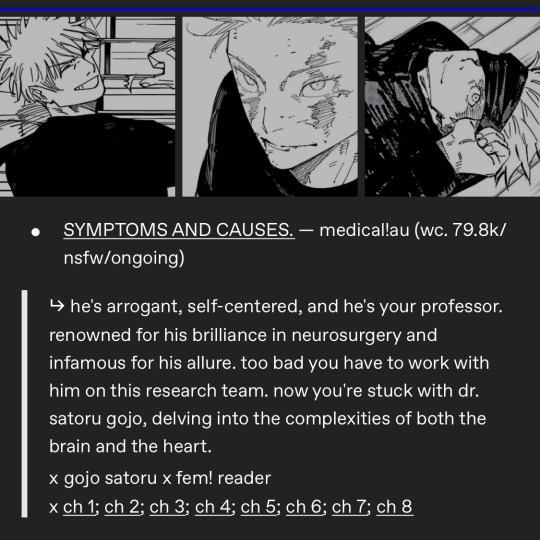

let me just…let me just try to even gather the reasons why you need to add this to your tbr lists (weekend is comin up too so perfect time)
characterization of gojo satoru.
gojo in this fic is characterized so fucking well, from chapter one. there are so many distinctive ways miss lostfractures goes about building his aura (word of mouth/reputation, dialogue, expository, primary interactions, secondary interactions, etc.) it reminds me of the show where gojo just has this energy to him that you can't tear yourself away from
i picture him in this fic to be unrelenting, unforgiving, morally grey, with an undertone of softness yet still feral through it all,, basically gojo during shibuya arc LOL. i looove reading cute silly boy gojo fics sm (he’s so baby) but THIS fic explores the borderline wicked side of him that is so thrilling, unique, and rare to find i think in this fandom’s collection of works. it’s just so fucking good.
forbidden romance.
UGGHH i love stories w forbidden romance. in this one, it’s med student reader x professor gojo (additional power dynamics in that he’s a senior surgeon in her field and also a research mentor in her study of interest…TRIPLE THREAT DAMN). i love how miss lostfractures doesn’t shy away from reminding the reader that it’s wrong, and that they shouldn’t be doing this. that’s my fave part of forbidden romances like yesss remind me again why this is all so wrong but let’s still do it anyways LOL <333
reader’s voice.
i’ve LOVED reader since the beginning, so relatable, emotionally mature, all her flaws are so believable & her strengths are shown seamlessly. it’s just so much fun to read because i’ll literally have a thought like “hmm…that (something a character said/did) doesn’t sound very convincing” and then the next line will be something like “he didn’t sound very convincing” like!!! me and s&c reader?? we’re locked in like this fr🤞🏼 like gojo’s domain expansion fingers
escapism.
everything in this story feels so damn real it’s insane. the pacing is stunning, love the utilization of stacks of scenes that are sort of short but so concise, enough to be a smooth read but still descriptive enough to entirely transport you into the world that’s being built. cannot praise the writing in this story enough. also the variety of ways that scenarios are made that pull characters closer to one another?? so creative. as someone who works in a research lab, studied bio in college (some of the fkn biochem stuff that comes up in this fic gives me heart attacks lmfaooo pls im traumatized), and has worked in clinics/hospitals it just itches my brain so damn good. you’ll be convinced you’re a brilliant med student while you read this fic.
writing.
the writing is just. so. good. it’s so good. better than most PUBLISHED works i’ve read. i really can't say much other than that, you just have to go see for yourself.
—
if any of these reasons speak to you, i highly recommend you check the fic out. just a note tho it does have some dark themes but you can find all the tags/warnings on her page!
OK BYE
#jujutsu kaisen#jujutsu kaisen fanfiction#gojo satoru#gojo x reader#gojo smut#jjk gojo#geto suguru#gojo satoru angst#series#alternate universe#romance#smut#fluff#angst#jjk smut#long fic#jjk series#medical au#gojo satoru x reader#satoru gojo x reader#fic rec#jujutsu kaisen fic rec#jjk fic rec#gojo satoru fic rec#gojo fic rec#celestie fic rec
481 notes
·
View notes
Note
What are some JBLs you recommend that have good kisses AND a good romance plot
LOL I can hear the pain behind this question, anon. It’s true that a lot of JBLs with a good romance story fail to deliver on the physical intimacy side of things, though that is becoming less and less the norm. I do have some that I think do both reasonably well. I don’t know exactly what “good romance” means to you, but I’m going to assume we’re talking about well-executed romance plots, regardless of the show’s overall genre and focus, where the characters and relationship arc make sense and don’t randomly derail somewhere along the way. Here’s what I got:
I Cannot Reach You
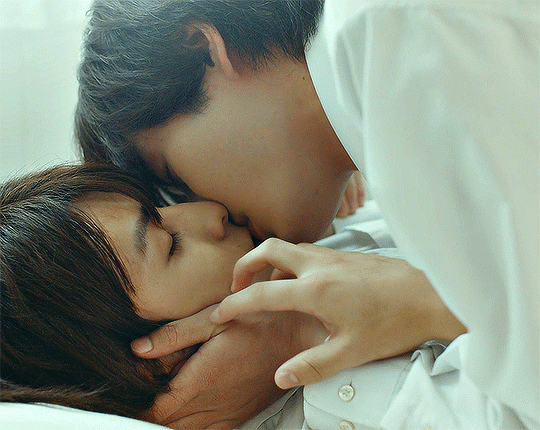
This is a high school friends to lovers (the cream of the crop for that trope, IMO). This is a story about realizing feelings and building the courage to change your most important relationship, so you’ll have to wait a bit to get those kisses but once you do, I think you’ll be pleased.
His

The second chance romance for me. This is a bl film about two men who come back together after a bad breakup and figure out how to make it work. I love them and this story so much.
Old Fashion Cupcake
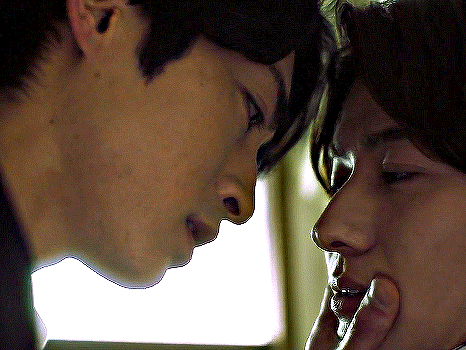
There’s only one kiss in this short and sweet show, but it’s a real doozy. A super tight workplace age gap romance that knows exactly what it’s doing.
At 25:00 in Akasaka
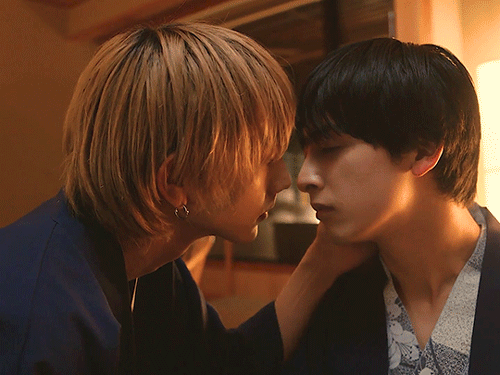
Two actors who went to college together meet again when they are cast opposite each other in a bl drama, and get tangled up in the blurred lines between their professional and personal relationships. Angst, baby!
The Pornographer

This series features some of the best kissing and sex scenes you will see anywhere in the bl genre, but warning that it’s a twisted and wild ride. There are five installments and you gotta watch them all to see the full picture of the character and romance arcs. It’s so rewarding if you do.
The End of the World With You

From the same mind of the previous entry and similarly hot and wild and weird. This show has more going on than the second chance romance at its core, but it themes come together beautifully.
Tokyo In April Is…

Another second chance romance, this one features a lot of sex but also deals with heavy subject matter, so mind the CWs. It’s one of my favorites of last year and the love story in this one has really stuck with me; it’s beautiful and so hard won.
Love is Better the Second Time Around

This one comes with a disclaimer that it goes off the rails in the final two episodes, but you asked for good kissing so it would feel wrong not to include it. Yet another second chance romance (are you picking up on a theme here?), this one gets two former high school lovers back together as adults to sort out their misunderstandings, lingering feelings, and buckets of sexual tension. It was so good—until it wasn’t.
#i cannot reach you#his the movie#old fashion cupcake#at 25:00 in akasaka#25 ji akasaka de#the pornographer#the end of the world with you#bokura no micro na shuumatsu#tokyo in april is...#love is better the second time around#japanese bl#shan recommends#shan answers
227 notes
·
View notes
Text
the problem with tua's ending is that it was IMPOSSIBLE to do without retconning and defacing the themes and characterizations that have been central to the story since the very first episode. if you had to end it that way, if it really was "the plan all along," then fine. there ARE good ways to do that -- so the execution should have been much different here if that was the case. take a look at "the good place," for example. everyone ceased to exist at the end of that story as well, but it was beautifully done because it ADDED to the show's core themes rather than take away from them. tua's ending was hollow and unavailing. at some point i have to commend the precision with which someone can desecrate an entire series and certain characters (looking at five, diego and lila especially) like this.
it made no sense. diego and lila formed a beautiful (albeit chaotic) relationship built upon mutual trust and authentic love that neither of them had ever experienced before. it was something they were teaching each other and learning together. that was a new beginning to them, and it was painted as such by the narrative. at no point were there hints that things would go sideways, no build up. every time they stumbled in the past it was still right back into each other's arms. at no point did their chaos look like an ending until it was shoved in our faces for... shock value? to shake things up? i fail to understand where it came from. they were relentlessly devoted to each other and the only two people who could stand each other for long. and so what became of them was very jarring. very messy.
five's ENTIRE character has been focused on and motivated by one thing: saving the people he loves. to the point that he was willing to let his own humanity become a forgone ideal, a renounced concept, as many times as it took. to the point that he essentially INVENTED TIME TRAVEL and INVENTED THE COMMISSION TO REGULATE IT. five's stoic exterior only barely concealed the claw-grip he had on every single family member, so why forget it now? why choose to go back on that? and in what world would five hargreeves willingly wait MONTHS to return to his family? because he was SUDDENLY in love with lila, no less? forgetting the very apparent fact that his age and body are not in alignment, five had never shown any interest in romance. especially not towards lila. but they do have very similar backgrounds, and so this was a chance to enrich the mutual understanding five and lila have with each other, expand the familial connections they have, especially seeing as how both of them -- in their own ways -- spent most of their life without that sort of connection.
ben's entire arc felt so, so out of place. completely and very ironically isolated from the entire rest of the series. nothing about it was fulfilling, nothing about it offered any sense of closure or even development. jennifer made no sense even as a plot device, much less as her own character. these two brought out nothing in each other.
klaus had the foundations of a good arc, but too much was introduced in too small an amount of time and none of it really went anywhere. i can say roughly the same for allison and viktor. THAT being said, of most of the scenes i did find myself genuinely enjoying this season, THOSE three were usually at the center! in fact, i really did love the scenes with klaus, allison, and claire. so that's cool. i guess. luther? he was just kind of... there?
and ray just fucked off with no explanation? okay. and reginald? until this point he had all the qualities of a potentially VERY GOOD and nuanced villain. his arc fell flat. and let's not forget all the other loose ends, but, you know, we've been here long enough. so. onto the next point.
none of these characters got to heal. none of them ever got to revel in anything meaningful, or, rather, the things that WERE meaningful across the whole series were rendered worthless because... none of it exists anymore! none of it ever existed! this is like an "it was all a dream" ending but much worse. and these characters are so, so incredible. i can only name a few other stories that have had characters i've connected to this deeply. and despite everything i could never really stop loving them. that makes it hurt more though tbh
anyways. i know i'm about to sound incredibly dramatic but the ending made me sob my lungs out. this show was really important to me. it led me to incredible people, other incredible stories, helped me live, etc. but i honestly found myself wishing i'd just never watched this series at all. the ending was eviscerating and Just Fucking Pointless. i don't think i'm ever going to be able to rewatch it. it's still hard for me to conceptualize that it was even real, that this is all we get. there's a lot more i could say about everything, but again, i've said a lot already and i'm not trying to write a fucking novel. i'll say more of what i want to in sporadic bursts i guess.
#the umbrella academy#tua#klaus hargreeves#allison hargreeves#viktor hargreeves#luther hargreeves#ben hargreeves#diego hargreeves#five hargreeves#lila pitts#umbrella academy
290 notes
·
View notes
Text
The worst part too about the Paladin quests is it's Heavensward that's most egregious. It honestly feels like someone had no idea what was going on, or didn't care, or left, and their colleagues left holding the bag with this mess of a story had no idea what to do with it.
ARR Gladiator quests are fine! They're along the lines of the other Class quests, intro you to the job and a complicated character dynamic, and it's a decent time.
The ARR Paladin quests...are just boring. They aren't actually even that bad, they're just...utterly predictable, bog-standard tropes and plot line where you can see everything coming malms away. But they have an internal logic to them that builds on the politics and scheming in Ul'dah. Jenlyns realizes he's an unwitting pawn of the Syndicate, and he was literally chosen for the job cuz he could be easily duped and controlled. He doesn't even get to have imposter syndrome, he's actually unfit for the job (and then strives to do better, leveraging support from Papashan and Mylla to shore up his own weaknesses, which is admirable!).
...Nevermind that traditional Paladins in general are a bad fit for Ul'dah. The heavily armored Sultansworn makes no sense in that desert environment, and looking at a world map we can even see that Southern Thanalan seems to be on the equator. Like it's not even a case of "it's cooler than it seems cuz they're further north." Because they're not. And I know the devs wanted to have Ishgard perhaps be a starter city but that was scrapped due to time and resources, fine but um.
Dragoons are still trained in Coerthas, by Coerthans. Why didn't they just...do that with Paladins? Keep Gladiator in Ul'dah, where it makes sense as presented. But then have to work with Temple Knights to get the Job. Especially since after Ul'dah's intro, the game just forgets the Sultansworn exist and they have no bearing on the MSQ the way the other factions in Ul'dah do. Not even in the finale of ARR's arc where it would make sense. Gladiators are a constant in other side quests and MSQ both.
Stormblood Paladin is also fine--because it goes back to those Gladiators, and we interact with Paladins and Knights across the realm, and deal with those complicated relationships between the Gladiator guild core members. It's internally logical in its drama about finally restoring Aldis's reputation and place in Ul'dah, against the backdrop of the tournament.
Heavensward Paladin straight up makes no sense. Solkzaygl's actions are entirely contradictory to his character and arc from ARR. There's no way for some of the actions to occur without him working with the outlaws in some way. Instead of teaching Constaint, he sends him on a merry chase across Coerthas to learn on his own, and it's only the WoL's aid that sees the boy live, let alone make progress. A random man dies, guilt-ridden, due to Solk's scheming and lies he confided to this poor guy.
And then Highlander-esque "there can be only one" nonsense. Even as a Highlander fangirl in my youth, it was insulting and awful. Papashan, Jenlyns, and Constaint all call out how nonsense, illogical, unlikely, and stupid this whole story is...all to make a sword shine.
Because there's no internal logic to events, let alone the reason for the string of happenstance that leads to the finale.
And we know it's possible; HW Blacksmith gives us a fantastic paladin story! One that fits Ishgard's storyline and HW's themes. HW Dark Knight is also a good paladin story, actually, as they are meant to be another angle on the concept of dedicated knight defenders. Samurai for the Eastern equivalent, and the concepts and tropes present in those quest chains.
But the job actually bearing the name "Paladin" is left in the dirt. As a fan of the concept across various games (video and TTRPGs both), it's quite frustrating how the devs had no idea what to do with this job, despite other members of the writing and scenario team presenting stories that would have fit perfectly well within the framework. Only some of it is misplacing where Paladins originate in the setting; the rest is not taking advantage of the themes and setting of the expansions, and just not caring enough about the characters and story to even try, compared to the rest. Or worse, they did try, and meant for more, but whatever intrigue and complex plot they wanted to create was too much for 5 quests and no guarantee the arc would continue in the future, even if it had landed perfectly.
#final fantasy xiv#Paladin#grumpy old lady hours#lore#speculation#These quests frustrate me so much#even considering other storylines I dislike for their structural issues HW PLD sits at 'worst' for me#meta analysis
242 notes
·
View notes
Text
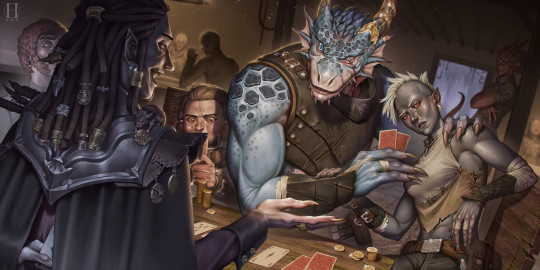
Dm Tip: Playing the Villain/ Guidelines for "Evil" Campaigns
I've never liked the idea of running an evil game, despite how often I've had people in my inbox asking how I'd go about it. I'm all about that zero-to-hero heroic fantasy not only because I'm a goodie twoshoes IRL but because the narrative-gameplay premise that d&d is built around falls apart if the party is a bunch of killhappy murder hobos. Not only would I get bored narrating such a game and indulging the sort of players who demands the freedom to kill and torture at will (I've had those before and they don't get invited back to my table), but the whole conceit of a party falls through when the obviously villainous player characters face their first real decision point and attempt to kill eachother because cooperation is a thing that goodguys do.
Then I realized I was going about it all wrong.
The problem was I had started out playing d&d with assholes, those "murder and torture" clowns who wanted to play grand-theft-auto in the worlds I'd created and ignore the story in favour of seeing how much unchallenged chaos they could create. They set my expectations for what an evil campaign was, and I spent the rest of my time developing as a dungeonmaster thinking " I Don't want any part of that"
But what would an evil campaign look like for my playgroup of emotionally healthy friends who understand character nuance? What would I need to change about the fundamental conceit of d&d adventures to refocus the game on the badguys while still following a similar enough narrative-gameplay premise to a hero game? How do we make that sort of game relatable? What sort of power/play fantasy can we indulge in without going off the deepend?
TLDR: In an evil campaign your players aren't playing the villains, they're the MINIONS, they're mooks, henchmen, goons, lackeys. They're the disposable underlings of uncaring overseers who have nothing but ill intent towards them and the world at large.
Where as in a hero game the party is given the freedom to challenge and overthrow corrupt systems, in an evil game the party is suck as part of that corrupt system, forced to bend and compromise and sacrifice in order to survive. The fantasy is one of escaping that corrupt system, of biding your time just long enough to find an opening, find the right leverage, then tossing a molitov behind you on the way out.
Fundamentally it's the fantasy of escaping a shitty job by bringing the whole company down and punching your asshole boss in the face for good measure.
Below the cut I'm going to get into more nuance about how to build these kinds of narratives, also feel free to check out my evil party tag for campaigns and adventures that fit with the theme.
Designing a campaign made to be played from the perspective of the badguys requires you to take a different angle on quest and narrative design. It’s not so simple as swapping out the traditionally good team for the traditionally bad team and vis versa, having your party cut through a dungeon filled with against angel worshiping holyfolk in place of demon worshipping cultists etc.
Instead, the primary villain of the first arc of the campaign should be your party’s boss. Not their direct overseer mind you, more CEO compared to the middle managers your party will be dealing with for the first leg of their journey. We should know a bit about that boss villain’s goals and a few hints at their motivation, enough for the party to understand that their actions are directly contributing to that inevitable doom.
“Gee, everyone knows lord Heldred swore revenge after being banished from the king’s council for dabbling in dark magic. I don’t know WHY he has us searching for these buried ancient tablets, but I bet it’s not good”
Next, you need a manager, someone who’s a part of the evil organization that the party directly interfaces with. The manager should have something over the party, whether it be threats of force, blackmail, economic dependency… anything that keeps the antiheroes on the manager’s leash. Whether you make your manager an obvious asshole or manipulative charmer, its important to maintain this power imbalance: The party arn’t going to be rewarded when the boss-villain’s plan goes off, the manager is, but the manager’s usefulness to the boss-villain is contingent on the work they’re getting the party to do. This tension puts us on a collison course to our first big narrative beat: do the party get tired of the manager’s abuse and run away? Do they kill the manager and get the attention of the upper ranks of the villainous organization? Do they work really hard at their jobs despite the obvious warning signs and outlive their usefulness? Do they upstage their manager and end up getting promoted, becoming rivals for the boss-villain’s favor?
Building this tension up and then seeing how it breaks makes for a great first arc, as it lets your party determine among themselves when enough is enough, and set their goals for what bettering the situation looks like.
As for designing those adventures, you’ll doubtlessly realize that since the party arn’t playing heroes you’ll need to change how the setup, conflict, and payoff work. They’re still protagonists, we want them to succeed after all, but we want to hammer home that they’re doing bad things without expecting them to jump directly to warcrimes.
Up to no good: The basic building block of any evil campaign, our party need to do something skullduggerous without alerting the authorities. This of course is going to be easier said than done, especially when the task spins out of control or proves far more daunting than first expected. The best the party can hope for is to make a distraction and then escape in the chaos, but it will very likely end with them being pursued in some manner (bounties, hunters, vengeful npcs and the like). Use this setup early in a campaign so you have an external force gunning for your party during the remainder of their adventures.
Dog eat dog: It’s sort of cheating to excuse your party’s villainous actions by having them go up against another villain who happens to be worse than they are. The trick is that we’re not going after this secondary group of outlaws because they’re bad, we’re doing it because they’ve either got something the boss wants, or they’re edging in on the boss’s turf. This sort of plotline sees the party disrupting or taking advantage of a rival’s operation, then taking over that operation and risking becoming just as villainous as that rival happened to be. This can also be combined with an “Up to no good” plot where both groups of miscreants need to step carefully without alerting an outside threat.
The lesser evil: This kind of plot sees your party sent out to deal with an antagonistic force that’s a threat not only to the boss’s plans but to everyone in general. In doing so they might end up fighting alongside some heroes, or accidentally doing good in the long run. This not only gives your party a taste of heroism, but gives them something in their back pocket that could be used to challenge the boss-villain in the future.
The double cross: In order to get what they want, the party need to “play along” with a traditional heroic narrative long enough to get their goal and then ditch. You have them play along specifically so they can get a taste of what life would be like if they weren't bastards, as well as to make friends with the NPCs inevitably going to betray. This is to make it hurt when you have the manager yank the leash and force the party to decide between finishing the job , or risk striking out on their own and playing hero in the short term while having just made a long term enemy. This is sort of plot is best used an adventure or two into the campaign, as the party will have already committed some villainous deeds that one good act can’t blot out.
Next, lets talk about the sort of scenarios you should be looking to avoid when writing an evil campaign:
Around the time I started playing d&d there was this trend of obtusely binary morality systems in videogames which claimed to offer choice but really only existed to let the player chose between the power fantasy of being traditionally virtuous or the power fantasy of being an edgy rebel. Early examples included:
Do you want to steal food from disaster victims? in Infamous
Do you as a space cop assault a reporter who’s being kind of annoying to you? in Mass Effect
Do you blow up an entire town of innocent people for the lols? in Fallout (no seriously check out hbomberguy’s teardowm on fallout 3’s morality system and how critics at the time ate it up)
I think these games, along with the generational backwash of 90s “edge” and 00s “grit” coloured a lot of people's expectations ( including mine) about what a "villain as protagonist" sort of narrative might look like. They're childish exaggerations, devoid of substance, made even worse by how blithely their narratives treat them.
Burn down an inn full of people is not a good quest objective for an evil party, because it forces the characters to reach cartoonish levels of villainy which dissociates them from their players. Force all the villagers into the inn so we can lock them inside and do our job uninterrupted lets the party be bad, but in a way that the players can see the reason behind it and stay synced up with their characters. The latter option also provides a great setup for when the party's actually monstrous overseer sets the inn on fire to get rid of any witnesses after the job is done. Now the party (and their players) are faced with a moral quandary, will they let themselves be accessories to a massacre or risk incurring their manager's wrath? Rather than jumping face first into cackling cruelty, these sorts of quandaries have them dance along the knife's edge between grim practicality and dangerous uncertainly; It brings the player and character closer together.
Finally, lets talk about ending the villain arc:
I don't think you can play a whole evil campaign. Both because the escalation required is narratively unsustainable, but also because the most interesting aspect of playing badguys is the breaking point. Just like heroes inevitably having doubts about whether or not they're doing the right thing, there's only so long that a group of antiheroes can go along KNOWING they're doing the wrong thing before they put their feet down and say "I'm out". I think you plan a evil campaign up until a specific "there's no coming back from this" storybeat, IE letting the Inn burn... whether or not the party allows it to happen, it's the lowest point the narrative will allow them to reach before they either fight back or allow themselves to be subsumed. If they rebel, you play out the rest of the arc dismantling the machine they helped to build, taking joy in its righteous destruction. If they keep going along, show them what they get for being cogs: inevitably betrayed, sacrificed, or used as canon fodder when the real heroes step in to do their jobs for them.
Art
#dm tip#dm tips#writing advice#evil party#drafting the adventure#dnd#d&d#dungeons and dragons#blades in the dark#ttprg#pathfinder
439 notes
·
View notes
Text
Let's talk about story structure.
Fabricating the narrative structure of your story can be difficult, and it can be helpful to use already known and well-established story structures as a sort of blueprint to guide you along the way. Before we delve into a few of the more popular ones, however, what exactly does this term entail?
Story structure refers to the framework or organization of a narrative. It is typically divided into key elements such as exposition, rising action, climax, falling action, and resolution, and serves as the skeleton upon which the plot, characters, and themes are built. It provides a roadmap of sorts for the progression of events and emotional arcs within a story.
Freytag's Pyramid:
Also known as a five-act structure, this is pretty much your standard story structure that you likely learned in English class at some point. It looks something like this:
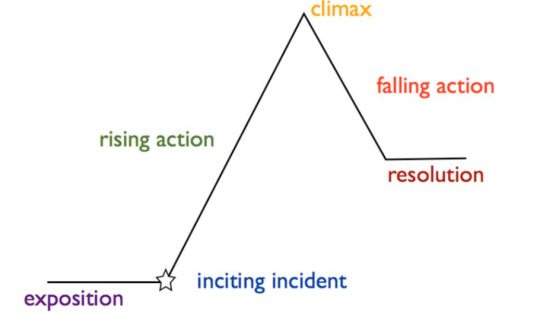
Exposition: Introduces the characters, setting, and basic situation of the story.
Inciting Incident: The event that sets the main conflict of the story in motion, often disrupting the status quo for the protagonist.
Rising Action: Series of events that build tension and escalate the conflict, leading toward the story's climax.
Climax: The highest point of tension or the turning point in the story, where the conflict reaches its peak and the outcome is decided.
Falling Action: Events that occur as a result of the climax, leading towards the resolution and tying up loose ends.
Resolution (or Denouement): The final outcome of the story, where the conflict is resolved, and any remaining questions or conflicts are addressed, providing closure for the audience.
Though the overuse of this story structure may be seen as a downside, it's used so much for a reason. Its intuitive structure provides a reliable framework for writers to build upon, ensuring clear progression and emotional resonance in their stories and drawing everything to a resolution that is satisfactory for the readers.
The Fichtean Curve:
The Fichtean Curve is characterised by a gradual rise in tension and conflict, leading to a climactic peak, followed by a swift resolution. It emphasises the building of suspense and intensity throughout the narrative, following a pattern of escalating crises leading to a climax representing the peak of the protagonist's struggle, then a swift resolution.
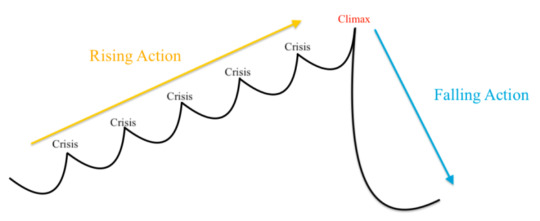
Initial Crisis: The story begins with a significant event or problem that immediately grabs the audience's attention, setting the plot in motion.
Escalating Crises: Additional challenges or complications arise, intensifying the protagonist's struggles and increasing the stakes.
Climax: The tension reaches its peak as the protagonist confronts the central obstacle or makes a crucial decision.
Swift Resolution: Following the climax, conflicts are rapidly resolved, often with a sudden shift or revelation, bringing closure to the narrative. Note that all loose ends may not be tied by the end, and that's completely fine as long as it works in your story—leaving some room for speculation or suspense can be intriguing.
The Hero’s Journey:
The Hero's Journey follows a protagonist through a transformative adventure. It outlines their journey from ordinary life into the unknown, encountering challenges, allies, and adversaries along the way, ultimately leading to personal growth and a return to the familiar world with newfound wisdom or treasures.
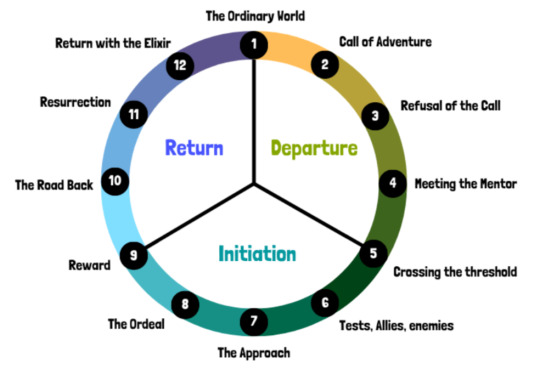
Call to Adventure: The hero receives a summons or challenge that disrupts their ordinary life.
Refusal of the Call: Initially, the hero may resist or hesitate in accepting the adventure.
Meeting the Mentor: The hero encounters a wise mentor who provides guidance and assistance.
Crossing the Threshold: The hero leaves their familiar world and enters the unknown, facing the challenges of the journey.
Trials and Tests: Along the journey, the hero faces various obstacles and adversaries that test their skills and resolve.
Approach to the Inmost Cave: The hero approaches the central conflict or their deepest fears.
The Ordeal: The hero faces their greatest challenge, often confronting the main antagonist or undergoing a significant transformation.
Reward: After overcoming the ordeal, the hero receives a reward, such as treasure, knowledge, or inner growth.
The Road Back: The hero begins the journey back to their ordinary world, encountering final obstacles or confrontations.
Resurrection: The hero faces one final test or ordeal that solidifies their transformation.
Return with the Elixir: The hero returns to the ordinary world, bringing back the lessons learned or treasures gained to benefit themselves or others.
Exploring these different story structures reveals the intricate paths characters traverse in their journeys. Each framework provides a blueprint for crafting engaging narratives that captivate audiences. Understanding these underlying structures can help gain an array of tools to create unforgettable tales that resonate with audiences of all kind.
Happy writing! Hope this was helpful ❤
Previous | Next
#writeblr#writing#writing tips#writing advice#writing help#writing resources#creative writing#story writing#storytelling#story structure#plot development#outlining#plot structure
361 notes
·
View notes
Text
Why, out of GF, Amphibia, and TOH, only Luz didn't have to leave her new world behind:
I've seen people complain about Amphibia and to a lesser extent, Gravity Falls, for having their series end with a goodbye; the main characters having to leave their found families and this world they've grown to love and return to regular life. But the thing is, the three shows all have MASSIVELY different morals, that each fit in with how the goodbyes (or lack thereof) work into the finales.
Gravity Falls has a large theme of temporary goodbyes and reconciling. Stan and Ford being the primary example. But there are others: Soos and Melony, Wendy and Robbie, even Dipper and Mabel to an extent. The show builds upon this with Gravity Falls being a VACATION, they aren't trapped there, they could theoretically go home at any time. Episodes such as Summerween and Dipper and Mabel Vs. The Future also build on the tone, telling that it's okay to both grow up and move on, but you don't have to leave behind what you once loved in doing so.
The final conflicts (Wierdmaggedon) are caused because of characters not being able to let go. Stan couldn't let go of Ford, Mabel couldn't let go of Gravity Falls, Gideon couldn't let go of Mabel.
Gravity Falls teaches the viewer that even if you love something, you have to let it go, and eventually it will return. In the words of Bill Cipher: "We'l meet again. Don't know where, don't know when. I just knew we'll meet again, some sunny day."
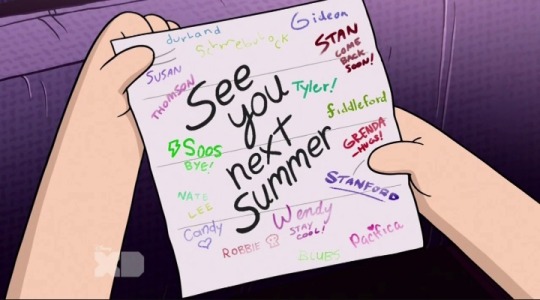
Amphibia has a similar theme of Gravity Falls, but it takes it further. Amphibia tells you that if you don't let go, sometimes things will only get worse. The primary example for this is the show's catalyst event: Marcy getting Anne to steal the Music Box. Marcy chose to go to Amphibia, rather than move away, and she dragged her friends into it with her. Instead of having a long distance friendship with Sasha and Anne, she took them to an alternate dimension in order to spend eternity on a massive adventure, and it got her killed. Marcy and Anne died and Sasha tried to kill herself.
And that's only Marcy. Sasha was a control freak that bordered on yandere at the height of her villain arc. Sasha couldn't accept that Anne was beginning to move on from the toxic friendship that the Calamity Trio had locked themselves into.
The trio were horrible to eachother, pre-character arcs, and they needed to focus on self improvement before they could even hope to be good friends. In the time between 'All In' and the epilog, the Calamity Trio would not have actually been able to be good for eachtoher. They say they forgive eachother, but that was forgiveness given during a WAR. Post show, the real feelings would start to bubble up. Anne's resentment for the betrayals, Marcy’s abandonment issues, Sasha's definite self hatred. The trio HAD to split up to have any semblance of a friendship.
Amphibia tells its audience that not all good things can last, and if you obsess and force it to stay, it can destroy you.
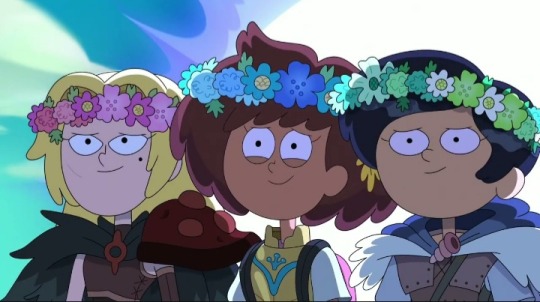
The Owl House has a completely opposite moral. It tells you to find your people, and fight for them.
Luz lived in the Human Realm, but it was never her home. Her home was with Camila and Manny, but when Manny died, Camila and Luz's relationship began to falter. That world wasn't her home. When Luz found the Boiling Isles, she was always supposed to be able to leave. This wasn't a summer trip she didn't want at first, or a one way portal. The Boiling Isles was HER choice.
Luz picked Bonesburrow. Luz picked Hexside. Luz picked The Owl House. Her home was always meant to be The Boiling Isles. She only started trying to find a way back to Earth because the choice was taken from her. Luz no longer had the choice to go back to the Human Realm. In fact, the only time Luz chose Humans over Isles was when she was PUNISHING herself for helping Belos.
Luz got to stay in the Boiling Isles because TOH tells its audience that where you start isn't where you should always stay. Find your place and find your people. And when you do, hold it dear and never let go. "Us weirdos have to stick together."
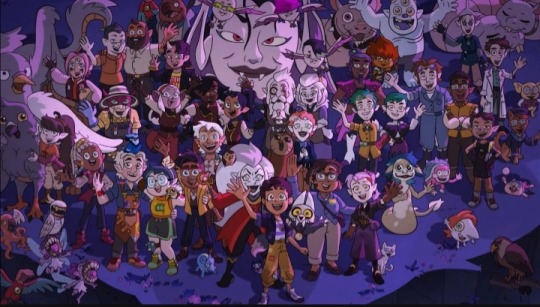
#the owl house#amphiba#gravity falls#luz noceda#anne boonchuy#sasha waybright#marcy wu#mabel pines#character essay#monologuing to the void#gravity falls spoilers#amphibia spoilers#the owl house spoilers
1K notes
·
View notes
Note
in case no one else has asked, please list your top 10 BL manga/manwha? 👀
i am. very interested in what other media you enjoy, especially BL
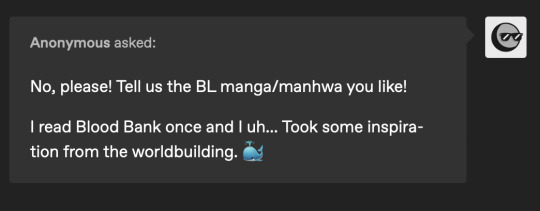
Combining these two bc I didn't wanna leave the second out!
(I wasn't a big fan of Blood Bank personally but I'm so glad it helped you with your world building Lil Whale!!)
I'm hoping some of these are unheard of for you guys because THERE ARE SO MANY BL/YAOI AND I READ THEM CONSTANTLY BUT NOT SO MANY ARE FANTASTIC AND MIND-BLOWING AND SPECTACULAR AND DEEPLY PSYCHOLOGICAL! I'm pretty sure I'll end up listing WAY more than 10, mainly because I want to highlight ones I feel like a lot of people haven't read. ALSO because I read so fucking many of them that I've collected a stash and NOW IS MY CHANCE TO YELL ABOUT THEM.
Just a disclaimer, these are not in any sort of order, as they're all about the same level in my head, just grouped. I'll list the "big name" BLs that I adore after these! First up are the ones that either have a quiet fandom or aren't well known! Since there'll be so many, I'm not going to say much about them, just know that usually no BL/Yaoi is perfect to me, since there are many bad psychology tropes here and there or unnecessary cruelties that aren't exactly realistic etc., but overall, I like the way that the story and characters are handled and/or love the art.
Here's the top five of my top ten that's not a top ten bc there are so many (I just said I wouldn't group them but I lied my ass off apparently):
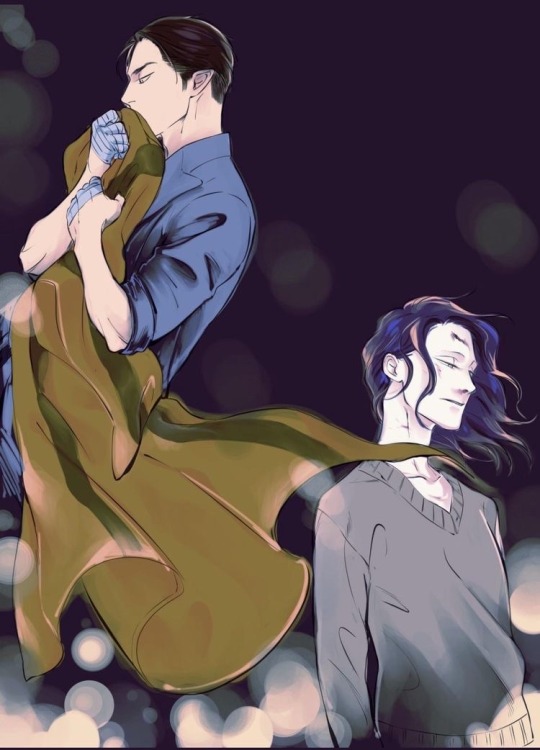
Jealousy [Scarlet Beriko]: This is one of those that emotionally hits so hard that it will stick with me forever and I will usually tear up just a tiny bit when I think back to the moments that made this one so beautiful. A lot of times a story with major hurt, angst, and tragedy won't wrap up with enough to make me scream and cheer at the end. But THIS ONE DID. And I stopped reading for a while when a big event happened because I thought it would end horribly and I'd have to suffer three weeks of fiction-induced depression for a man who wasn't even real. BUT NAY. The themes you get in this one revolve around loneliness (huge draw for me, it always hits), mafia-connected characters and the rivalries from that, self-destructive prostitution, and characters who have difficulty receiving love without freaking out. Are those even themes idk. OH WELL. YOU GET THE POINT. I want this one on my shelf. You might've heard of it, but the fandom is silent so I never did. T_T OH ALSO THE ART ON THIS ONE IS GORGEOUS I FUCKING LOVE IT.

Hitori to Hitori no 3650nichi [Hitomi]: First of all, favorite manga artist. FAVORITE MANGA ARTIST. I'm never exactly sure if the artist is also the writer or if the writer is never the artist or...BUT IT DOESN'T MATTER. Anyway! I listed this particular title because it was the first that I found by this person - but then I discovered it was a part of a bigger series, and there are like I DON'T KNOW FIVE DIFFERENT MANGA?? OR SOMETHING??? Related to this one. I don't know which order, I just know that I read them all in a frenzy. THE CHARACTERS. OH! OH THE CHARACTERS! Oh my gods, it's so good. LMFAO. The arcs these characters have are fantastic, and I loved the fact that the abuser in one is shown to be the victim of abuse in a prequel story, and that his anger issues and other elements of his personality came about to affect him and destroy him. Just...I don't recall the details, READ IT. That's all. Spectacular depictions of nuanced trauma within abusive relationships.
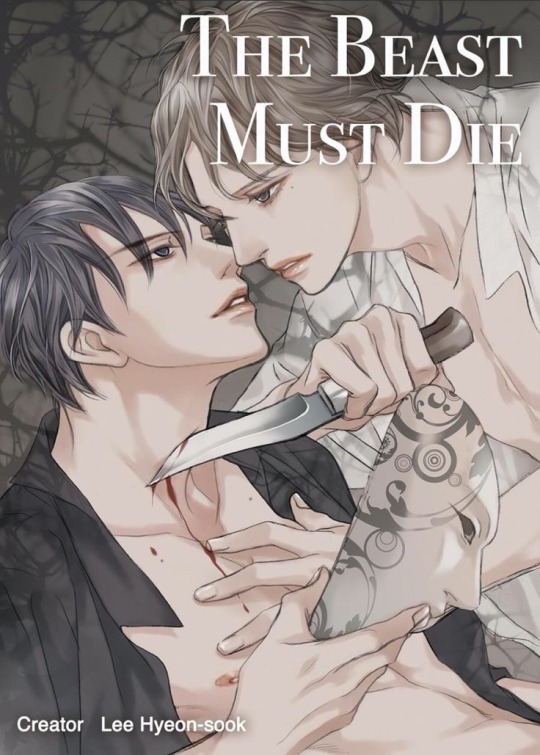
The Beast Must Die [Lee Hyeon Sook]: This remains one of my favorite depictions IN ANY MEDIA of a psychopath, because it's SO accurate and I'm SO fucking proud of the author for doing their research and OH MY GODS YOU GUYS IT'S ABOUT TO GET A DRAMA CD LET'S FUCKING GO! This story is so good. It's so evil. It's so psycho-thriller. It's so WELL DONE. It features a dark academia-ish secret society within a college setting who hunt people for sport, sometimes. LIKE. Come on. And the psychopath (dark hair) IS THE MAIN LOVE INTEREST! You could literally hear the summary and go "oh this is for Sadist". And I don't get a lot of those that deliver this well. SOMETIMES the art makes me twist my head a little but YOU KNOW WHAT I DO NOT CARE OKAY? It's just SO good. There's murder, there's kidnapping, and - most importantly - a main character who doesn't just DEAL with whatever the psychopath does. He's smart, he fights back, he learns to understand psychopathy to determine if he should remain with the love interest...it's fantastic. That's all. I will stop. *BANGS THE WALL*
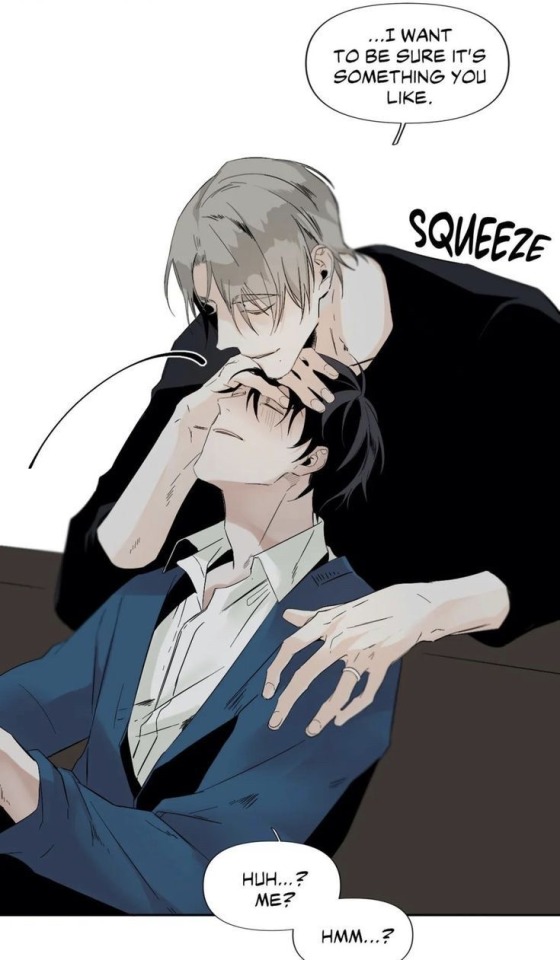
Aporia [Seontae]: ALL HAIL THE HEALTHY BDSM RELATIONSHIPS THAT STILL HOLD TENSION AND EMOTIONAL WEIGHT AND SPEAK TO ME!!!!!!! HELLO!!!!! This is my favorite BDSM-themed story. Everything is consensual, but is everything safe??? Not when it comes to the main character's emotions and tendency to sacrifice his wellbeing for a partner. BUT NOT TO WORRY, HIS SADISTIC LOVE INTEREST IS CONSIDERATE AND ATTENTIVE AND CARES ABOUT HIS FEELINGS!! This is, perhaps, one of my favorite depictions of a REAL sadist. A real one as in a realistic, irl BDSM-relationship sadist. Someone who is just as worried about taking care of his partner as he is about hurting him JUUUUST right. ANYWAY! THAT'S ALL! READ IT! HE'S LITERALLY ME!
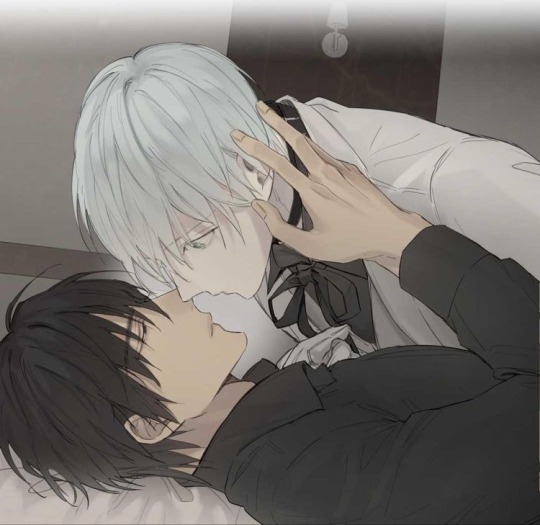
Royal Servant [MasterGin, Chungnyun]: Okay, we were talking about healthy BDSM in the previous one, now let's talk about TOXIC BDSM-THEMES THAT I LOVE. Lmao. DO YOU LIKE MASTER/SLAVE DYNAMICS? DO YOU LIKE STORIES WHERE THE ARC LEADS TO THE ABUSIVE MASTER EVENTUALLY LEARNING TO NOT BE ABUSIVE AND LOVE THE SLAVE? YEAH ME TOO. I DON'T NEED TO DESCRIBE THIS ANY FURTHER. AUTHOR OF ANGEL BUDDY, THIS IS THE ONE THAT I KNEW HER FOR FIRST.
A bunch of other good ones you may or may not have heard of (I won't describe every one of these unless I have something particular to say, so enjoy the pictures from them that I snatched):
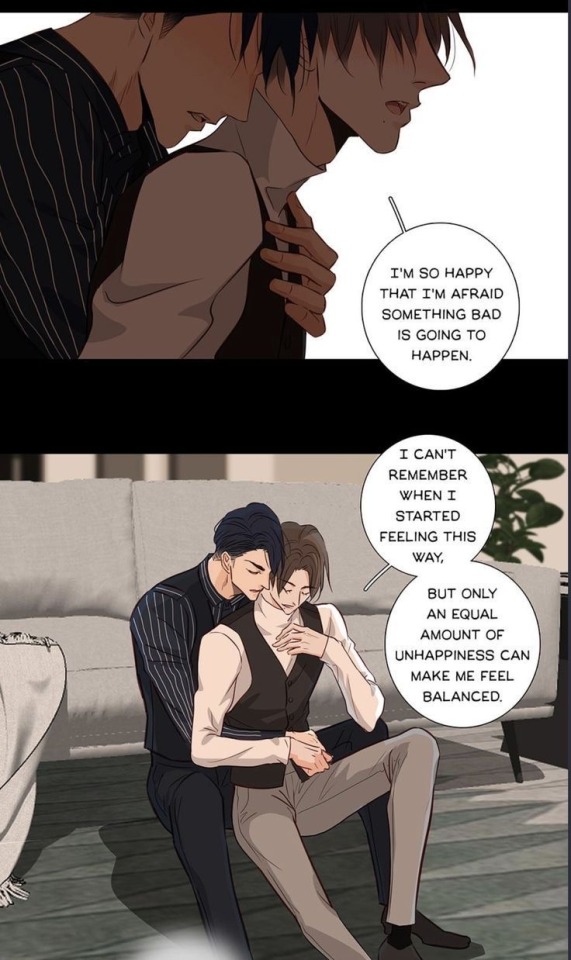
Love me in the Wilderness [Wang Tao]
Neon Sign Amber [Ogeretsu Tanaka]
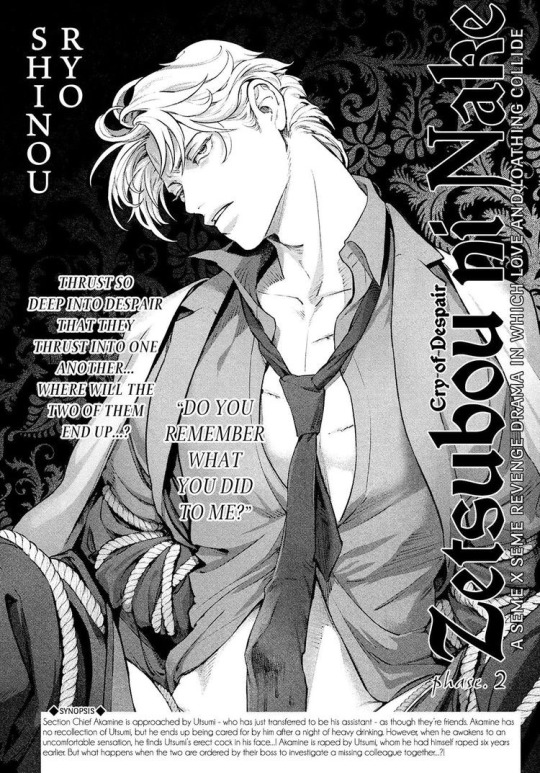
Zetsubou ni Nake [Shinou Ryo]: Guys. This story is UNIQUE AS HELL. I had to say something about it. The premise is that a man who was raped turns around and goes back after his rapist and rapes him back, and then they fall in love. IT'S....the amount of times my jaw dropped was insane on this one. SOMEHOW IT'S WRITTEN SO WELL. SOMEHOW THEY NAILED THE STRANGE REALISM OF IT AND HAD ME TEARING UP OVER THE INTENSITY OF THE RAPE SCENES. VERY WELL-PACED, VERY TRAUMATIC IN A GOOD WAY. HIGHLY RECOMMEND. The way they come to love each other after this crazy foundation of mutual rape is IMPRESSIVE. Kudos to the writer.
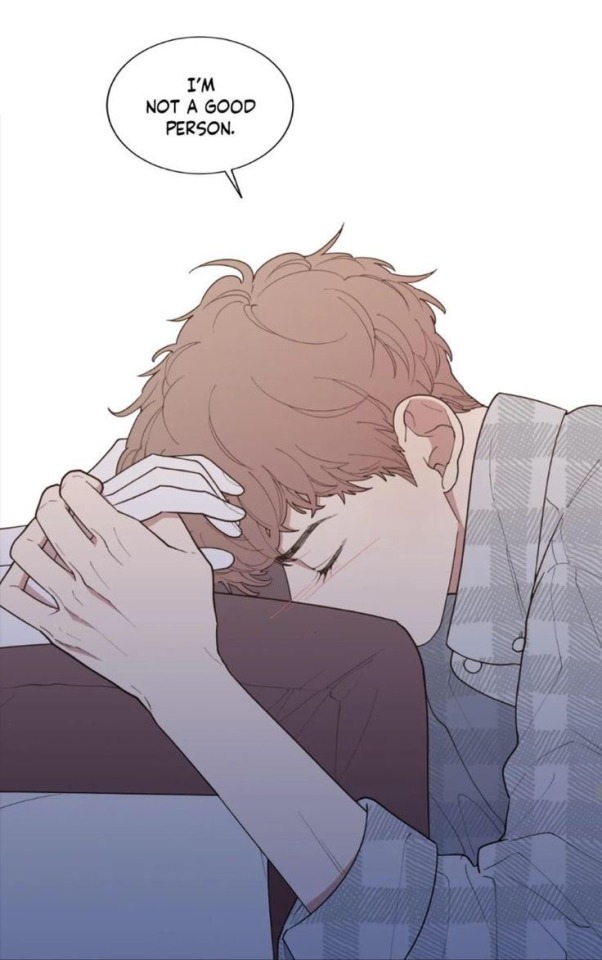
Love or Hate [Yeongha]: This is a very well-known one but there's like zero fandom so I think it fits here. Also a lot of hate going around for it? Which I never understood, fuck those guys. This remains one of the most beautifully-written that I've ever read, and I mean that purely in like...the ACTUAL writing on the page. I'm talking poetry, purple prose. I just recall being blown away by that, and no manga before or since has ever reached its level. For once I felt like the writer was also a novelist because of the way that they put things, and had a clear voice in the style. Did the main boy end up with someone I didn't want him to end up with at the end? Yes. But I felt like it fit pretty well, and it was sort of a tragedy, and it was supposed to hit you painfully in the gut. A lot of people were mad at the main character for that and I don't really think it's fair. In any case! A beautiful story with complex characters and intriguing dilemmas. Highly recommend it.
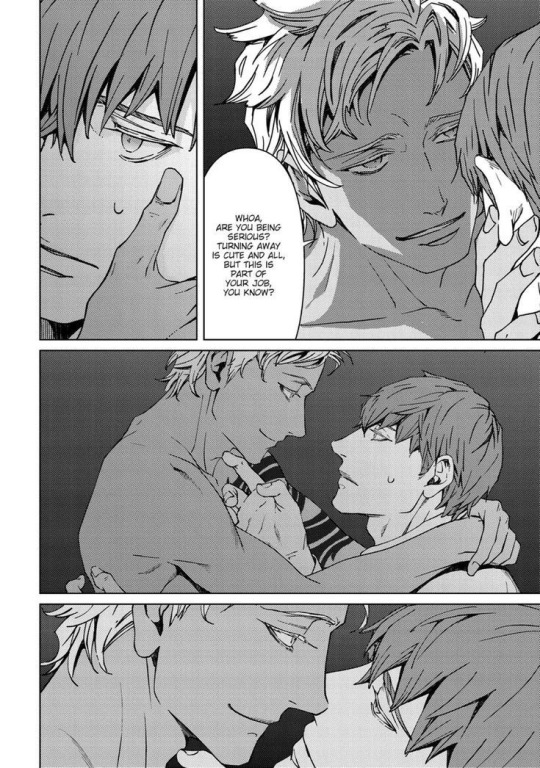
Shangri La no Tori (Birds of Shangri La) [Ranmaru Zariya]
Two in Six Billion [Denzou]
The Pizza Delivery Man and The Gold Palace [Upi]: Great story and character-building so far! I will say that once it became porn, it dove a little too heavily into it for me. Like I only needed one scene of the porn, I was enjoying the panic attack scenes much more. BUT YEAH, IT'S ONGOING, SO WE'LL SEE WHERE IT GOES! But the panic attack scenes were the reason I read it and yes, I did tear up.
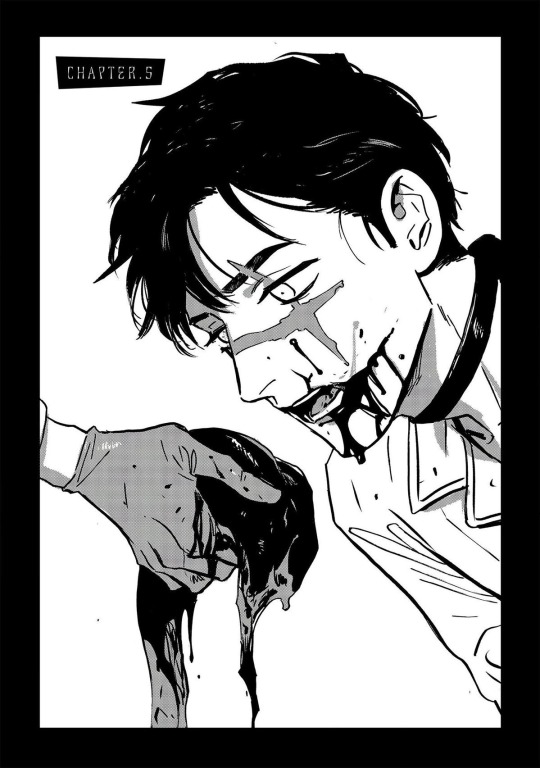
Sleeping Dead and Living Dead [Asada Nemui]: I RECENTLY FOUND THIS ONE AND ADOOOOOOREEE IT SO MUCH. I DO NOT CARE THAT IT'S AN OLD SCIENTIST AND HIS ZOMBIE PATIENT. NORMALLY THAT WOULD HOLD NO SWAY OVER ME, BUT OH GODS, THE ART IS SO PRETTY AND THE STORY IS SO GOOD. I LOVE THE LITTLE ZOMBIE MAN! I LOVE THE LITTLE ROMANCE THEY'VE GOT!
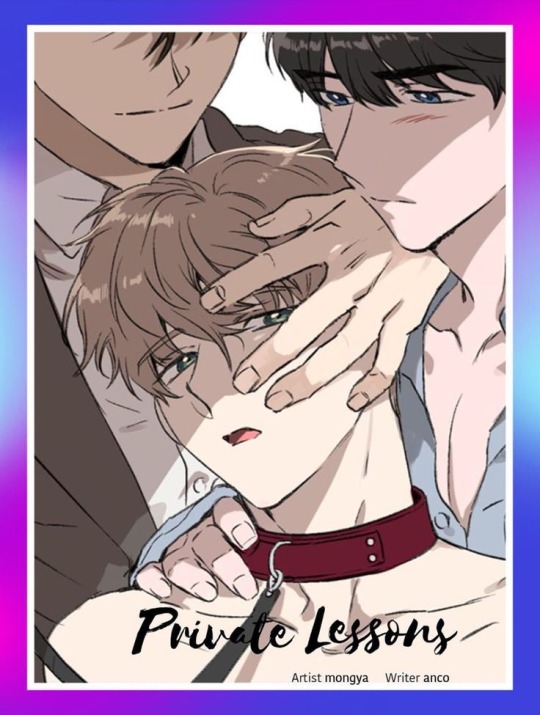
Private Lessons [ANCO, Mongya]: It's cuuuuute what can I saayyyyy it has BDSM and threesomes and I liked it. Very entertaining. Scratches the BDSM itch and the little SUB WAS SO CUTE. Anyway.
Kingyo no Ubugoe [Gontaku Nido]
From Points of Three [White Eared]: Threesome dynamics!!
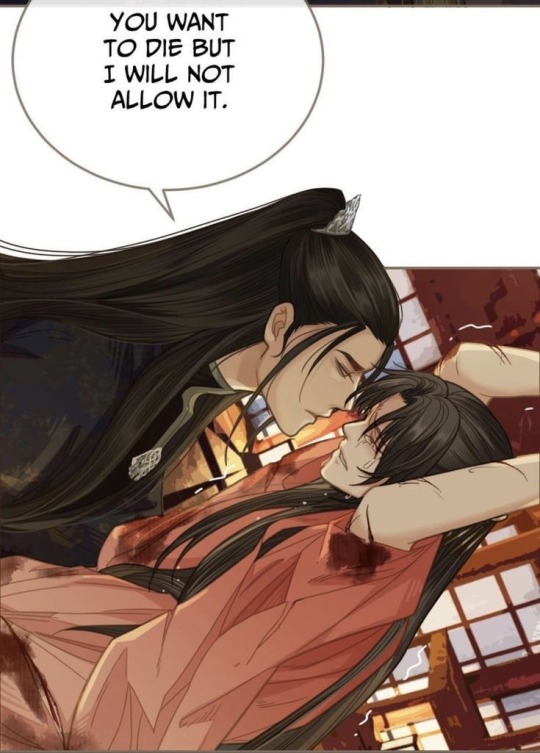
Silent Lover [Qiang Tang, Bai Li Jun Xi]: I STOPPED THIS ONE AT A CERTAIN POINT BECAUSE IT DIPPED INTO WEIRD M-PREG AND STUFF I CANNOT READ. But BEFORE all that, I was deeply ingrained in this one. It has a main character who can't speak (a particular weakness of mine) and he's OH SO CUTE and he's given as a sex slave basically to the emperor (emperor? idk he's a kingly man, something like that), and the emperor is evil but learns to be soft and yet it takes a LONG TIME SO I WAS BAWLING HYSTERICALLY OVER SOME OF THE HEARTWRENCHINGLY PAINFUL SCENES IN THIS FOR THE POOR YUU-ER. A good read until it decided to go the omegaverse-by-magic-potions route. I didn't stay to figure out where it actually ended up.
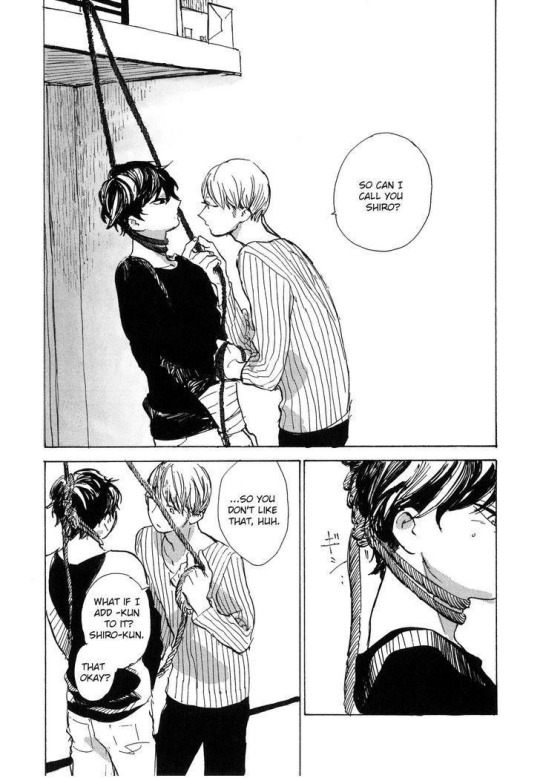
Yoru wa Tomodachi [Ido Gihou]
Toumei na Ai no Utsuwa [Hitomi]
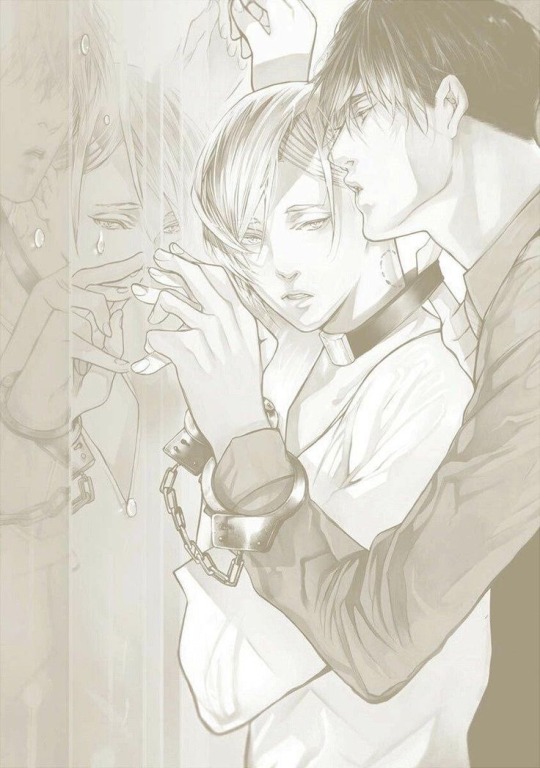
Re:Birth [Misuaki Asou]: The singular omegaverse story in existence that I actually liked. Hopefully that says a lot. Mostly because it's about the omegaverse elements NOT being present for the main character and him trying to fake it because he's lonely and afraid that his partner (an alpha *shakes off the disgusting label because who the fuck thought alpha was a cool word*) will leave him if he finds out he's just a regular guy (aka beta I guess? ABO is weird idc).
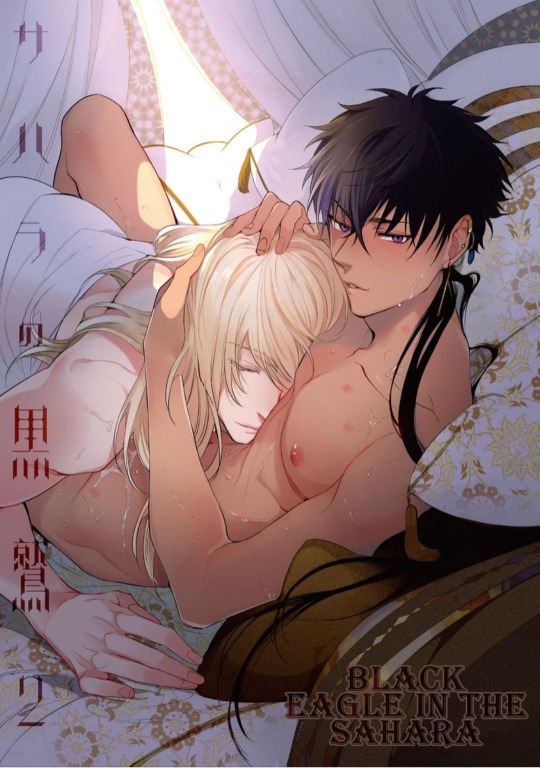
Sahara no Kuro Washi [Soutome Emu]: MASTER SLAVE MASTER SLAVE---
Haru ni Kaeru [Kunieda Saika]
Incorrigible [Bbong]
Well Done! [ANCO, Mongya]
Nemuri Otoko to Koi Otoko [Zariya Ranmaru]
Even If You Don't Love Me [Pando]: It dropped off SUPER hard (it's ongoing still) but damn was it good in the beginning. I am sick and tired of where it's at currently but the psychological manipulation and the horror of a certain twist in the storyline was CRUSHING to me. I only wish that it would have gone a better way after it happened, because it slowly destroyed itself and became like a lot of tropey rape stories. The asshole just keeps being an asshole and it's not really where the story seemed to want to go with that. But otherwise, it started off strong and I'll give it kudos for that.
Bigger titles I'm pretty sure everyone has heard of that I enjoy:
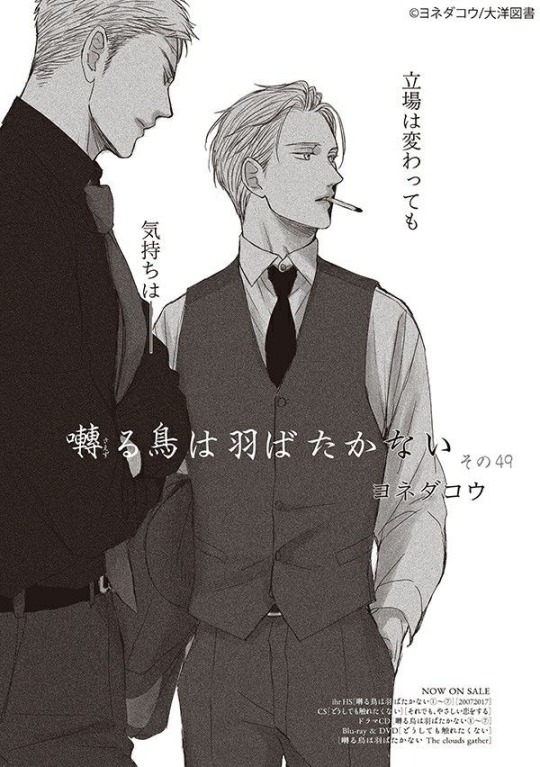
Saezuru Tori wa Habatakanai [Yoneda Kou]: Is it a little unrealistic that literally everyone in this story is gay apparently and wants to fuck one man apparently and/or rape him? Yes, absolutely. Does that matter once you're in the story and it's so good and all these unrealistic cruelties make a really strong bond between the main love interest and this self-destructive masochist who's probably not really a masochist but only interested in hurting himself because he doesn't know how else to handle his trauma from childhood? Ummmm yeah. Anyway! This one had a lot of inspiration and a lot of tears and a lot of obsession from me. I re-read it all the time, I watch the movie over and over, I listen to the audio drama and cry at my favorite scenes. Do I care in the end that it's a little unrealistic at times? No but I do laugh sometimes when I'm about to share it with a new person. Because BL is just like that generally and you've got to put up with a little of those tropes to find your favorite stories. THIS IS ONE OF THE TOP FAVORITES OF ALL TIME FOR ME BTW, IT'S ONLY SO LOW DOWN HERE BECAUSE PRETTY MUCH EVERYONE IN YAOI KNOWS ABOUT THIS ONE ALREADY, AND WE'RE ALL AWARE OF HOW GOOD IT IS.
ENNEAD [Mojito]: I will say that this is basically the best manga/comic/manhua...what's the Chinese word idk ANYTHING OF THIS MEDIA TYPE that I have ever read. It's not done, and people have been complaining that it's starting to fall into the common BL tropes but you know what I do NOT care. Mojito is a genius, Mojito is a master storyteller, Mojito is beautiful, Mojito is strong - I just love Mojito and this work. So much. The action, the horror of rape, the deep-set character conflicts and dilemmas and internal turmoils. Everything, nailed it. Nailed it. And not to mention it's set in FUCKING EGYPTIAN MYTHOLOGY AND THEY'RE ALL GODS AND THEY HAVE SUCH COOL BATTLES AND COSTUMES AND DUDE???? I'm so hooked. That's all.
Killing Stalking [Koogi]: OBVIOUSLY. I don't really need to say anything about this one except that yeah, some of the psychology is a little off and some of it is just super shallow. But I loved the characters and that's what mattered in the end. I fell in love with Sangwoo too and it ripped my heart out when I read the ending. I was depressed for like two weeks and it was the first story that had ever affected me that way, but I was also younger and this was one of my first yaoi/BLs and yeah. GREAT story though, fantastic storytelling, very lovable characters. Sangwoo was handled so much better than most "asshole/kidnapper/rapist" characters and I will never stop appreciating that, because a lot of writers tend to forget that your villains have to have redeeming qualities if you want us to like them (????). Jinx, I'm fucking coming for you. Suck my dick. KOOGI FTW.
Missing Love/A Married Man [In Hyerin]: Some of the DESCRIPTIONS of how trauma works especially of the sexual nature in this story are SO. SO. GOOD. However, I am beginning to grow VERY ANNOYED at where it decided to go with the most current updates of the story. The author did enough trauma to the main boy, now it's getting so incredibly excessive that it's overdoing it and the author's kinks are showing through. LIKE I GET IT. Okay? I do. But this one became too much and I need him to return to the actual story arc of going through that trauma so he can HEAL with the right person taking care of him.
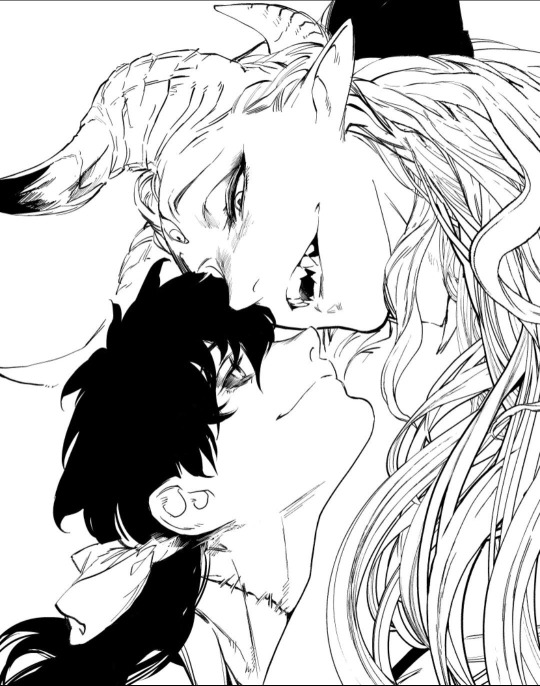
MadK [Ryo Sumiyoshi]: I am into NONE of the kinks that would lead to me picking up this manga. I hate demons, I'm not a monsterfucker, I can't do extreme guro, and yet I SAW CANNIBALISM. THAT WAS THE ONE THING THAT I THOUGHT I'D GIVE IT A TRY FOR. And then accidentally I got obsessed because the plot is AMAZING and the writing is SO GOOD and who cares if I hate demons and monsters ALL OF THEM ARE BADASS AND HOT (??) AND IT CEASES TO MATTER. Good on the writer for making them appeal by personality alone and expressions and whatever else you signed a deal with the devil to make me like because it worked. Also the guro is beautiful, so it doesn't even matter. Hannibal levels.
Warehouse [Killerwhale]
Painter of the Night [Byeonduck]
Viewfinder/Finder [Yamane Ayano]
Given [Kizu Natsuki, Gusari]
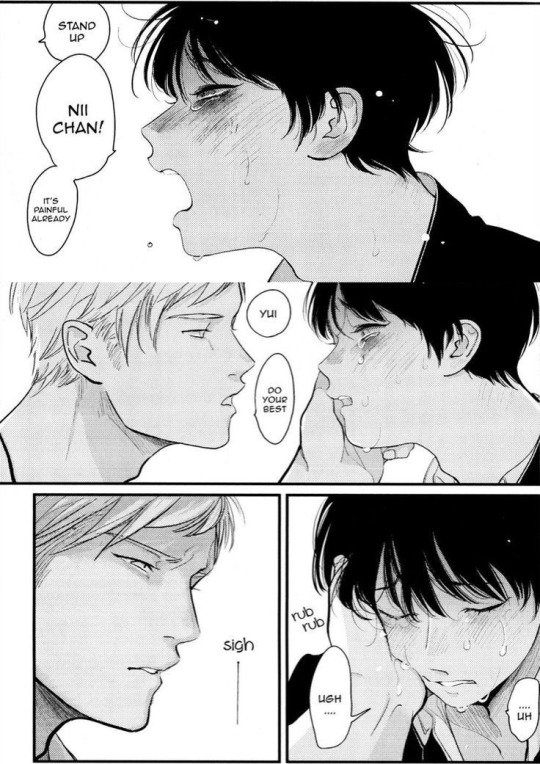
Nii-Chan [Harada] (and basically every other work by Harada)
Sadistic Beauty Side Story [Geumsan Lee, Woo Yeonhui]
Dine With a Vampire [Pangin, Pinko]
Angel Buddy [Mastergin, Chungnyun]
My Partner's Tastes and Fetishes [Deok Hwa]
Interview with a Murderer [KJK]
On or Off [A1]
Steel Under Silk [Snob]
The Pawn's Revenge [Evy]: It was going to be SO GOOD! And then it dropped off harder than a boulder from a balcony and I have absolutely no idea why the author took it the way that they took it, but go off I guess. It's boring as hell now but it started off with promise and I enjoyed the art and character designs. Too bad, I suppose.
Caste Heaven [Ogawa Chise]: An old classic with all the sticky sometimes icky mostly ridiculous BL tropes but hey, it's cute. It's sexy. It's fun. I don't care.
Wet Sand [Doyak]: We're still in the beginning stage of this one but I'm excited to see where it goes! Plus the art SLAPS ASS like nobody's business.
19 Days [Old Xian]: I hate comedy, I hate fluff, I hate buddies that never become lovers, but none of that mattered when I picked this one up. The duality of man. Bite-sized chapters and ACTUALLY AN EVENTUAL ROMANCE that none of us thought we'd ever get.
Legs That Won't Walk [Black Apricot]: Although this one dropped off hard for me and I'm really just following it to see if it picks up again and does something interesting (it probably won't) I did enjoy it in the beginning. I just get tired of the "asshole just keeps being an asshole and nothing else but woobified slut keeps coming back to him??" without the strong and realistic undercurrent of Reasons Why Someone Would Come Back such as manipulation or threats or unhealthy attachment. Perhaps it was sorta there in the beginning with them but now I'm just like why are we still continuing this story.
Pearl Boy [Inking, Zoy]: *Awkwardly scratches neck* It's not the best okay? It's not. It's really not. I don't like half of the things that occur in this one, but the ART, bro. THE ART, BRO? That's what got me into it and what kept me into it, PLUS I do like little Jooha. I stayed for Jooha, too. Dooshik drives me a little batty most of the time and looks ugly for half the story to me, but when he's badass, he's pretty badass, so I can forgive him. I really don't know why he has such drastically changing appearances because I thought he was someone completely different for a bit LMAO. In any case, I have to admit I like the uhhhhh danger that Jooha gets himself into and the crazy things that make no sense but you know what he gets hurt and then there's comfort and rescue and they cry and I cease to care that it makes no sense. (Sorta, I don't actually cease to care I just laugh awkwardly and go okay sure that's how it works because it's so hard to find stories that don't do this LOL I'm beating a dead horse) BUT WHY DOES HE CUM PEARLS? WILL WE EVER KNOW? WHO THE HELL THOUGHT OF THAT AND WITHOUT A SUPPORTING MAGIC SYSTEM IN THE WORLD TO MAKE THAT MAKE SENSE? IT WENT DOWNHILL SO FAST AND THE ENDING IS TERRIBLE BTW. THE VILLAIN SUCKS.
That's it. I can't talk to much or I'll run out of words but HOPE YOU GUYS FIND SOME NEW READS!!
#why does Tumblr only allow a certain amount of images#what a crime#bl recommendation#yaoi manga#yaoi recommendation#bl manga#top ten#my favorites#my recs#yaoi#sadist’s answered asks#whump#fujoshi#yaoi bl#saezuru tori wa habatakanai#scarlet beriko#harada#killing stalking
511 notes
·
View notes